01.01.70
Welcome
Welcome to the Weblog. This is where I post the occasional thinkpiece, in-depth review, or whatever else I feel like. The page itself remains a work in progress, but I'm pretty happy with it [1]. Click the title of a post to expand it.
aaaaaaaaaaaaaaaaaaaaaaaaaaaaaaaaaaaaaaaaaaaaaaaaaaaaaaaaaaaaaaaaaaaaaaaaaaaaaaaaaaaaaaaaaaaaaaaaaaaaaaaaaaaaaaaaaaa
02.10.25
Slop, Rot, And Thought
I don't mean to brag, but I think of myself as pretty good with computers. I use one almost every day, I have several in my home, and I spend a growing amount of my time tinkering with computers to try and make them do interesting or useful things.
I was born in 1998, so I've always lived in the digital age, and I've been online in some form or another since I was a little kid (RIP Flipnote Hatena, the last nice website I ever used). I have always loved making things and I have usually found computers to be very helpful in the making of things—as have, I think, most people in the world with an interest in music or film or art or animation or et cetera.

Still from my 49-second short film "100% Natural Ingredients," 2011.
But this helpfulness, or rather utility, is the full extent of my view of computers. A computer is a tool. It is not a decision-maker or a boss or a teacher; in certain configurations I might give you "pet," but I would never consider a computer to be a person, let alone a friend.
You've probably seen or heard quoted this IBM slide from the late '70s, which reads:
A COMPUTER CAN NEVER BE HELD ACCOUNTABLE
THEREFORE A COMPUTER MUST NEVER MAKE A MANAGEMENT DECISION
At the time this was advice meant to dull the sparkle in the eyes of computer-crazy CEOs—back then, after all, these were almost entirely Business Machines, and most of the related speculation was office-themed: spreadsheets compiled with unprecedented speed, rooms of typists replaced by a single workstation. To remind these people that a computer cannot be meaningfully punished for an error—and, implicitly, that computers are capable of errors—kept those visions in check.

This quote is widely attributed to Paul R. Ehrlich, but feels written for a coffee mug. eBay
What this bright IBM salesperson could never have foreseen is that computers' lack of accountability would become their greatest strength: that the increasing opacity of increasingly large and arcane digial systems would result in computers scoring, effectively, a total cultural victory over humankind.
The main difference between the Internet of my youth and the Internet of today is in its geography relative to a user. Back in the day (let's say circa 2008, although that's about when the shift began) the Internet felt much more suited to the term "net": it was easy, by exploring it, to come away with the image of online space as a patchwork landscape of roughly constant density. It was a landscape full of both wonders and garbage, but the critical quality is that it felt traversible; we sometimes called this "surfing the net."
Today, I think, the Internet is much more deserving of the term "web," specifically a classic spider's. The user sits in the center, looking down a series of spokes (apps, etc.) which conduct the vibrations of a trapped bug (algorithmically-selected "content") inward toward the center. Today's Internet is not a place you explore, it's a product that is served to you, ideally at such a speed and volume as to drown that previous wanderlust. The online experience is no longer about exploration and discovery; it's your own personal panopticon where you swivel around hoping to catch something juicy. Today, on much of the web, even the illusion of choice is fading.

David S. Ferry III / Wikimedia
About a year ago when Cohost was still around—a site I loved for shunning algorithmic curation entirely—I posted on there musing about how I feel like a total outsider for not seeing the appeal in the web-shaped Internet.
Do people actually like using an app/platform that just chooses stuff for you to look at constantly? I know that apps with strong "algorithms" capable of blasting users with 5 to 20 videos a minute selected to be more or less agreeable to their taste profile are currently the most powerful cultural forces on earth, but, like, am I really a fringe weirdo for thinking that it would be nice to just see things my friends make/post/enjoy and check out things they like or suggest? Just seems so weird to me that the major appeal of TikTok and its ilk is the near-total stripping from the end user of the power to curate their own feed.
This post is too long (said the guy coming back to it in the middle of a 20x-longer post) and reads like I was already feeling grouchy about something else. I dimly remember getting a response along the lines of "It's too much work to seek anything on your own now." Which I found kind of distressing, but I'm old, so maybe it's just me.
The thing I didn't enunciate here is that the world of algorithmic, high-throughput content delivery is a system intentionally engineered to extract and exploit, and it's founded on the twisting of a simple rule:
A COMPUTER CAN NEVER BE HELD ACCOUNTABLE
THEREFORE OUR COMPUTER CAN BE EVIL FOR US
In 1980, the biggest use of computing power was probably something like handling payroll for the post office. Today, the biggest use of computing power is finding new ways to make you look at ads; a sector that is getting more invasive and insidious for every dollar pumped into it. Infamously, Facebook's ad algorithm taught itself to diagnose users with personality disorders and then leverage them for clicks—for example, blasting people it considered to be bipolar with ads for flights to Las Vegas during a manic episode. And that's a story from six or seven years ago that they felt was light enough to make public—in 2025, when your car might be selling digital copies of your butt-print to the highest bidder, one shudders to imagine the amoral techniques these black boxes employ to sell you more soda.
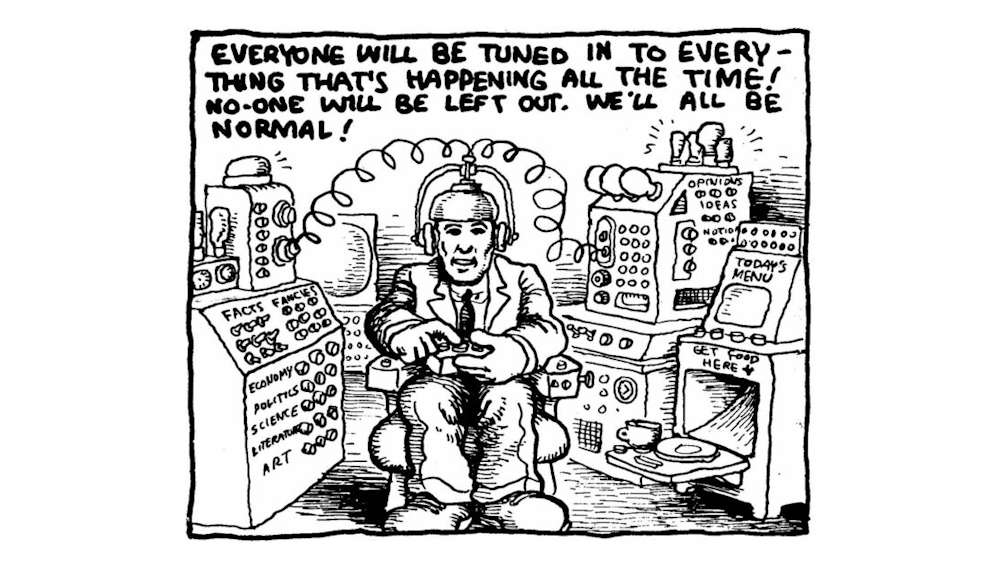
From R. Crumb's 'City of the Future', Zap Comix #0, 1967
The machinery of "content" is, of course, a human-built apparatus that serves the humans who built it. I think that the unaccountability of the computers at work is being used as a shield: at this point it's widely believed that not even the developers working on Instagram's "algorithm" fully understand how it interpolates user data back into recommended posts. If this is true, and we've created a machine that exceeds human understanding for the purpose of driving up subscriptions to "RocketMoney," then it needs to be dismantled and destroyed immediately. But if it's false, as I suspect, it's an evasive and dangerous lie.
The web-shaped firehose array of the modern net makes it feel like a public utility or a natural force: you open the tap and stuff comes out until you close it. If the software deciding what stuff comes out of whose tap is straining the comprehension of its designers, then it's lightyears beyond the grasp of the average end user, and for that reason it's far more comfortable not to think about it at all. People make stuff, send it to the machine, and the machine redistributes it in the order it thinks will yield the most eyes-on-screen time and therefore sell the most ad space. What's so easy to forget is that the machine will never understand the stuff it sorts.
A COMPUTER CAN NEVER APPRECIATE SOMETHING
THEREFORE A COMPUTER WILL NEVER RECOMMEND SOMETHING GOOD
I always feel kind of skeeved out when people talk about what "my TikTok has been showing me" as if the computer program assigned to your ID and tasked with juicing the maximum of your attention is a misguided pet cat who sometimes brings you a dead bird. It's obvious that we don't think of these daemons as human, the way people kid about "my FBI agent," but there's also a level of affection that blinds us to the real purpose of these tailored algorithms, which is, again, making you not close the app before you watch the next vertical commercial. Or to mold your thinking in other nasty ways.
YouTube's autoplay algorithm is massively responsible for baiting young men into white supremacy and far-right nationalism. While I assume they have some guys turning knobs to keep the heat off these days, there was a period where any YouTube tab left unchecked would eventually gravivtate toward Ben Shapiro or Dennis Prager (hopefully in hell by the time I post this) or some other Nazi freak's channel and swirl around it endlessly, serving up more and more fervent chum until the viewer is convinced to murder 51 innocent people in a mosque, among other examples.
These algorithms are not immutable or unstoppable. They are not forces of nature. They are just (albeit complicated) computer programs running on computers built and coded by human beings. The problem is that their owners would prefer that the force-of-nature image prevail, because it affords them massive leverage over our society and culture with very little scrutiny. I dunno, Senator, the computer did it. We pretty much just let that thing run on its own.
The recent panic about TikTok and its possible Chinese influence on American kids is kind of silly when you check if there's been any similar government intervention against American-made apps doing the same shit (there hasn't). But I think it's illuminating that the people in power understand what our poor content-fed children don't: these "algorithms" are built and maintained to reflect the whims of their owners, who are not computers. What even the people in power ignore, or simply like, is the fact that the propaganda is very much coming from inside the house.
As the sun sets on America, the algorithm's masters are getting bold enough to just make plays in the open. Instagram has started hiding posts that contradict the Trump/Musk agenda. Twitter, before its dipshit CEO went part-time to become the new Racism Czar, was basically an app that told you to follow Laura Loomer fifteen times a day in between flagrant scams and gore videos. This is all thanks to decades of capitalist seizure of the Internet: once a freeform medium for all kinds of human expression, it's now pretty much a stack of five corporate websites to tab through. At the best of times, these websites all try to show you the same unfunny videos in different aspect ratios—at the worst of times (right now, for example), their massive combined footprint is a bludgeon against dissent. The reactionary capitalist monoculture we all thought the Internet stood to destroy is mostly destroyed, in the sense that like the president of CBS doesn't decide elections anymore. But in its place is a new and arguably worse psychological monopoly shaped by the disguised whims of right-wing freaks like Musk and Zuckerberg.

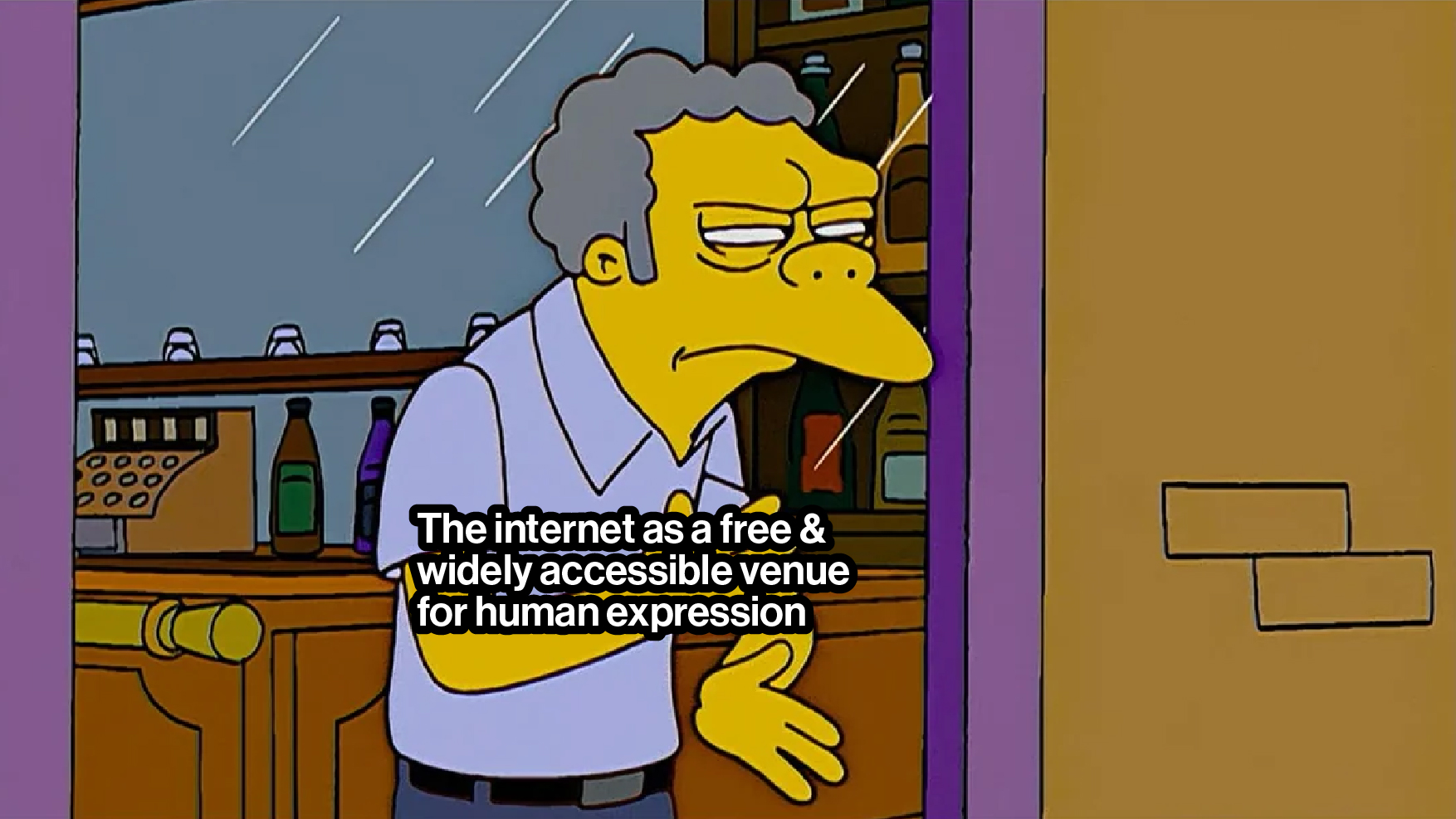
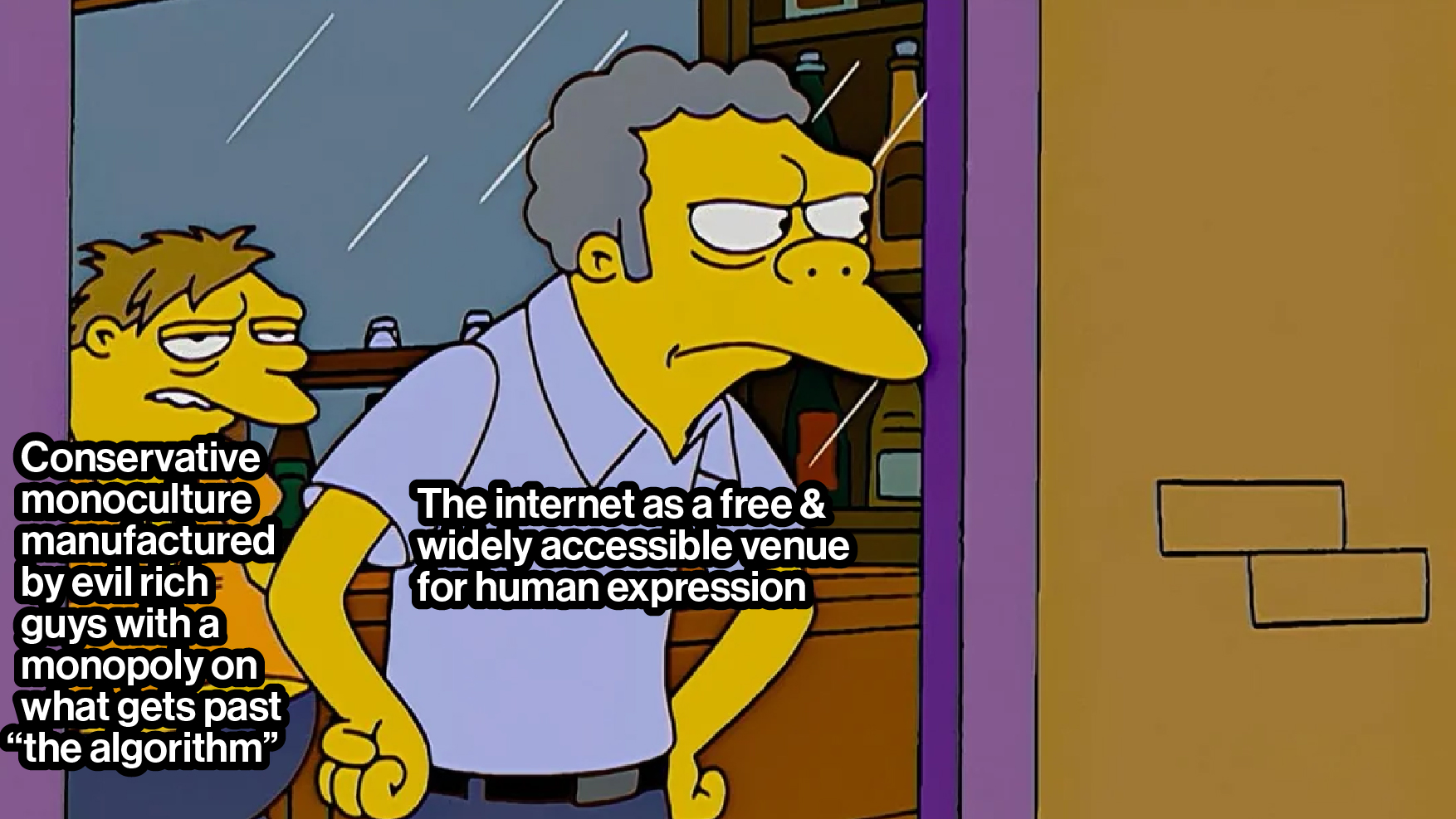
I was a little upset when I realized 2,000 words into this post that I could basically summarize it as a meme.
In 2003, a philosopher named Nick Bostrom published a thought experiment that has become a sort of parable in artificial intelligence studies. It's usually known as the Paperclip Maximizer or Paperclip Problem. The gist is this: Imagine an AI system with access to massive resources, and whose entire set of instructions is the prompt: "Make as many paperclips as possible." Being an amoral computer, and without any safeguards in place, this entity would likely conclude that having humans around who might switch it off is a hazard to paperclip production, and that all those atoms currently inside living things are just sub-optimized raw paperclip material; this machine would, given the ability, destroy all known life because it has no way to understand that that's a bad thing to do. This hypothetical, maniacal machine has no concept of loss or life, only an all-consuming drive to make a number go up.
What the modern data industry has created is a junior version of the paperclip maximizer that strives to generate advertising revenue but does not comprehend anything else about the world or human beings. Imagine an artificial intelligence with access to millions of cell phones whose entire directive is: "Keep as many people scrolling for as long as you can." There's no safeguard like "By the way, try not to fracture consensus reality into endless pockets of differently-deranged weirdos" built in, either because there's no way to do this (in which case the machine must be destroyed) or because, in a chilling sort of solidarity with their mechanical minions, the algorithm's billionaire masters simply don't care about us life-forms.
The result is a metaphorical planet of paperclips orbiting a dying sun. Meta and company rake in incomprehensible profits by exchanging your relatives' sanity for screen time for ad buys. And once you've built the machine, it's just as easy to manufacture consent for a fascist regime as it is to manufacture demand for Wicked tickets. Everybody lives at the center of their own little web, and everybody thinks that their web represents the true state of things. You could blame it on American individualism or general entitlement or illiteracy, and I do in part, but it doesn't change anything.
A computer is a tool, and it's important to recognize that it's a tool which can be used against you just as easily as you use it yourself.
I have a take on what the solution is (it's to break up the web into a net again), but I worry that we're years past the point where that's possible. I don't believe that we will ever see the state inflict serious pressure against the algorithm-masters, given that they own a growing portion of it. All we can do, individually, is ask if our time is not more valuable to us than it is to a machine, and always ask what the man behind that machine might be trying to get from you.
If you can be told what you can see or read,
Then it follows that you can be told what to say or think.
Defend your constitutionally protected rights.
No one else will do it for you.
Thank you.
– Boards of Canada, One Very Important Thought
01.14.25
The Uncreatives
The other day I saw this clip of Mikey Shulman, founder of an AI startup called Suno, giving an incredibly distressing soundbyte on some tech-doofus podcast. The key part of it follows:
“It’s not really enjoyable to make music now… it takes a lot of time, it takes a lot of practice, you have to get really good at an instrument or really good at a piece of production software. I think the majority of people don’t enjoy the majority of time they spend making music.”
Dozens of AI “founders” and the investors they're ripping off have spent their pet technology's ascent peddling basically this same line, one so obviously, intractably wrong that it's easy to ignore in the same way you ignore a QAnon-poisoned relative. There's no difference in verity, to me, between saying "Making something is boring and sucks" and saying, like, "the Pleaidians are protecting the soul of JFK Junior in order to kneecap the deep state."
AI guys are just another splinter of our ruined consensus reality, sailing along in their own universe where a computer program capable of imitating an annoying liar is on the verge of redefining civilization. (It's probably just a coincidence that this faction's most prominent members are annoying liars.) Generative AI—which is totally different from stealing, because it also demands colossal amounts of energy—has fooled enough of the world's richest and most powerful people that it now seems inevitable that AI will take over countless tasks once done by creative people, regardless of how shitty the results.

My photo from the Pennsylvania Farm Show, January 2025
Now, you probably think that in order to choose an objectively worse computer-generated version of some creative project (movie, illustration, song) over one made by a real person, someone would have to be so callous and calculating that their only priority is something appearing on demand, and whether it looks hideous or sounds terrible is beyond their concern—basically, a person no more discerning about art than the computer they're employing. And if the idea of a sociopathic class of parasites clamoring to drown you and me figuratively in vapid slop and literally in boiling seawater in order to marginally improve their stock price is alarming to you, then I have some bad news: these people own and control every aspect of our culture.
Meta (née Facebook) has been pouring useless AI bloatware into Instagram for months: serving users alarming computer-generated ads featuring themselves, populating the site with openly-fake profiles, begging you to hop in a DM chat with a language model based on Sonic the Hedgehog, et cetera. Does anyone like any of this slop? Does it even make money? I doubt it. But I do know that Mark Zuckerberg is 40 billion dollars in the hole on AI tech and needs to wring his percieved money's worth out of it whether the end user likes it or not.
I could write several more paragraphs about how generative AI is a technology so comorbidly evil and inadequate that, with any luck, it will go the way of the NFT as the bubble collapses. But other people have covered that topic extensively. What I'm more concerned about is the type of person generative AI appeals to, and how their influence represents a threat much broader than their current fascination.
For years I've enjoyed the work of Swedish artist Simon Stålenhag. You've probably seen his work—rural impressions of a sci-fi future, mysterious machines towering over foggy landscapes. The narrative they tell is one of regular people with meager means navigating a world increasingly occupied by industrial and military bulk: inscrutable but massive constructions that squat on the horizon, invincible even in their destruction; capitalism marking the physical landscape the same way it has stained our own psychology.
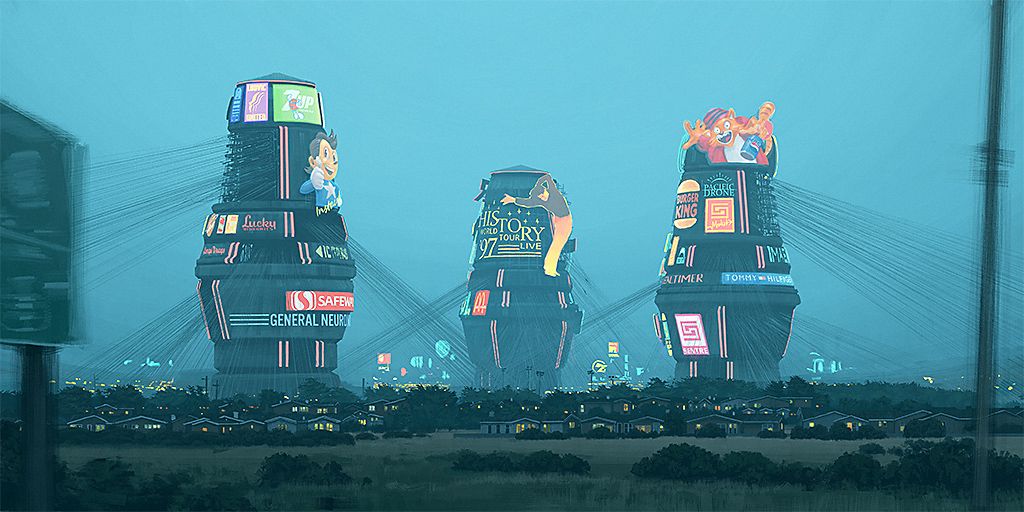
Simon Stålenhag, ‘Bell Towers’ from ‘The Electric State,’ 2017.
His 2017 book The Electric State, which pairs a series of paintings with a story told in increments and vignettes, follows a girl on a road trip across the western United States as society, atomized by the alienation of a nebulous VR technology, falls apart.
In late 1997, a young woman and her small yellow robot travel west through a strange American landscape where the ruins of gigantic battle drones litter the countryside [...] As they approach the edge of the continent, the world outside the car window seems to unravel at an even faster pace, as if somewhere beyond the horizon, the hollow core of civilization has finally caved in.
Stålenhag's art is bleak and moody in a way that is obvious commentary on technocapitalism. The seed of the collapse in The Electric State is—spoiler—a digital shoggoth emergent from untested military technology deployed by a corporate startup that is harvesting human neurons for processing power. The Convergence, as it's referred to, is reminiscent of Charles Stross's theory of corporations as alien beings made up of humans but wholly unhumanlike, where “Individual atomized humans are thus either co-opted by these entities (you can live very nicely as a CEO or a politician, as long as you don't bite the feeding hand) or steamrollered if they try to resist.”
Late last year, vapid-slop powerhouse Netflix announced that their movie adaptation of The Electric State will star Millie Bobby Brown and Mr. Peanut and will tell a story dressed in Stalenhåg's signature look that appears to have nothing in common with his ideas. Instead, I assume, it will contain a bunch of people saying “so that just happened” and shooting two guns while doing a backflip.

Still from The Electric State (2025, dir. Anthony & Joe Russo). IMDb
Look, the gripe that a book adaptation didn't do it right is generations old. Watching this annoying trailer peel the aesthetic surface off an interesting work of art and stretch it over some other dumber thing about Disneyland and Chris Pratt was offensive, if predictable. All the interesting facets are going to get sanded off when that thing becomes “intellectual property” and has to make money instead of communicate a vision. But this one in particular really stuck with me, because it's such an egregious version of that sanding-off that you can see exactly what happened.
Clearly, someone pitched a movie to Netflix of their own conceit that was about a ragtag cast navigating the aftermath of a robot uprising. That pitch may even have been good! What Netflix—what the people who spend the money at Netflix—did was take that pitch, see some glint of mass appeal in it, and then cram the most marketable bits between the title and visual style of a very different science-fiction project with better name recognition: one that, portraying technological capitalism as a civilization-killing cancer, probably looked to a massive streaming website like it could use a new plot.
The result is a film that doesn't just (allegedly, it's out in March) stink, it stands as an insult to both the things it's made of: two ideas deemed “similar enough” and scavenged for their most SEO-optimized parts while ignoring their creative spirit or intended tone completely. Watching Chris Pratt throw off tired quips while gunning down a bunch of generic robots backdropped by Stalenhåg's eerie, looming structures and Scandinavian atmoshpere is so disjointed and absurd that it almost approaches art by an accident of executive muddling.
These are the people who think generative AI is brilliant. They are people completely devoid of imagination or creativity who must have everything explained in terms of something they've already seen, that everyone else has already seen. And above all else these are people who value quantity over quality to a fanatical degree. If something exists, it can be sold, and whether it's good or makes sense or contains any shred of integrity is just a higher cost for the same amount of sellable product. I guess I would find software that can spin up a barely-legible JPEG of a pretzel impressive if my only qualifier was that it wasn't there before.
To people like us, AI art is generally derivative, generic, and uninteresting, being as it is the mathematical average of tons and tons of stolen art with the soul filtered out. But picture the flipside of this: to an executive or a markerting department looking to sell the public an inoffensive work of fluff, AI delivers ideas pre-sanded-smooth and without a person behind them to pay or to field complaints from when you rip them off. It's a weak substitute for inspiration: ideas that seem to come out of nowhere, but, unlike ideas a person has, arrive fully malformed and ready to roll.

Still from an AI-generated Coca-Cola commercial that looks like total dogshit and was still on TV every day for the last two months. Coke / Wall Street Journal
Joe Russo, who co-directed The Electric State, is the guy quoted in that article I linked above about AI-generated custom movies. It contains this quote, which is illuminating the same way that Mikey Shulman clip is.
"You could walk into your house and save the AI on your streaming platform," he added. "'Hey, I want a movie starring my photoreal avatar and Marilyn Monroe's photoreal avatar,'" Russo explained. "'I want it to be a rom-com because I've had a rough day,' and it renders a very competent story with dialogue that mimics your voice."
I keep thinking about this idea, partly because it's insanely embarrassing to admit you want but also because it's so illuminating about how these decision-makers see no distinction between art and content. Burning thirty acres of rainforest so my TV can spit up a movie where a shambling, goo-fingered fascimile of myself trades some repetitive, emotionless dialogue with a likewise-reanimated Marilyn Monroe sounds, to me, pretty horrifying. And even in a future where the technology becomes magically competent and renewably powered it sounds insanely boring. This is the fantasy of someone who has never wanted to feel challenged or even affected by a work of art in any way; someone happy to live awash in algorithmic pablum whose only and deepest ambition is to eliminate ambition of any other kind. You're drooling at the prospect of spending your entire life jacking off in the holodeck when the best version of it we even have is a Virtual Boy.
This is the flipside of the Shulman coin: the rich and powerful yearn for a world where everything is easy, instant, and uninteresting because that's the only thing they know. I'm not even the ten-thousandth guy to point out that capitalism segregates the classes into separate worlds with totally different rules, but the way the owning class understands reality is explained so plainly by how they feel about art.
You might remember YouTube essayist Hbomberguy's video Plagiarism and You(Tube), which made some waves at the end of 2023. The part people mostly talked about is his brutal dissection of some film-analysis dork who spent years making financially-successful content scraping other people's writing. It's also about plagiarism as a 21st-century phenomenon, the insidious ways it happens online when ad money is at stake, and what we might do to defend original ideas.
One small aspect of that video I kept with me is the framing of plagiarism as more than an act of theft: it's an act of contempt. You probably wouldn't steal someone's writing if you thought your audience would find it awful, but by stealing it you are placing the original author beneath your respect. To the uncreative class making the choices about what gets greenlit and advertised, this is routine: to yoink somebody's idea with less clout than you is morally identical to finding a nickel on the ground.
That's the thing I'm trying to relate about the thieving class and the moneymen and the studio execs: it's not just that they view art as a disposable, fungible sludge to be monetized, it's that they view you specifically as lower than dirt for making art when it's so easy to just steal someone else's. Why haven't you figured out yet that you can just steal? And that brings me back to this Suno guy claiming “the majority of people don’t enjoy the majority of time they spend making music.” Because the creative impulse is not part of his own experience, he writes it out of existence. It's the core claim of somebody fundamentally uncreative.
I want to draw a clear distinction between creativity and skill: it's totally possible to enjoy something you're bad at. Even incompetent or weird or derivative art is art when a person made it and cared about it. A child making their mom a crude birthday card is no less valid a work of art than a marble sculpture: the thing that makes it art is the human intention behind the act. Outsourcing the intention feels like a sour-grapes move at best and a total missing of the point at worst. As author Ted Chiang wrote last year:
It is a fundamentally dehumanizing technology because it treats us as less than what we are: creators and apprehenders of meaning. It reduces the amount of intention in the world.
One argument I hear a lot in favor of generative AI is that it lowers the skill floor for people who lack the ability to draw or write something from scratch. This is a silly line of reasoning: something you asked a computer to make is no more your own creation than something you asked a person to make (plus it will be much worse in every technical aspect). And getting “good” at typing “photoreal artstation highly detailed 4K” into a text box is not a skill. Even the most theoretically impressive work of AI art is spiritually a pinewood derby car your dad built while you were inside watching TV.
The uncreatives understand intellectually that art is important to people. They grasp its economic usefulness for sure, and many of them have some inkling that it is also engaging emotionally. The issue is that—whether it's plain capitalist sociopathy or a bitterness that money can't buy imagination—they think art is only important and meaningful to people below themselves; and so they feel entitled to steal it, crush it into paste, make nasty mockeries on the computer, and tell themselves it's just as good if not better. Which, if this wasn't largely the same group of people destroying our society for cash, would be kind of sad.
12.03.24
Ads For Dinner
One of my favorite websites in the world is Brand Eating. It's a years-deep blog, run by someone in California who cryptically refer to themselves only as “Q,” sharing fast-food press releases and sometimes reviewing limited-time items. The review photos always include a quarter for scale, which makes me laugh every time.

Photo: Brand Eating
My partner and I like to play a game sometimes where I read her a Brand Eating headline with a key word missing and she has to guess what goes in the blank. Usually it's either a purposefully-weird menu item (“Jack in the Box Tests New Burrito Filled With [blank?]”) or a purposefully-weird PR stunt (KFC Launches Dating App, or whatever obnoxious Wieden & Kennedy-ass thing they're doing now). These are the two primary types of marketing.
The world of fast food rests entirely on marketing. The food—even regular eaters will tell you—sucks. In the last few years places like Taco Bell have gone from being cheap bulk slop to bulk slop that costs just as much as real food. The margins are sky-high compared to a normal slow-style restaurant, which allows fast-food chains to employ huge marketing departments tasked with tricking you into wanting the product. Imagine a world where the only burger you've ever known is like, a totally serviceable homestyle burger from the neighborhood bar-n-grill. Now imagine that one day McDonald's pops into existence—devoid of all the childhood goodwill and monolithic presence they've bought in our timeline—and offers you a marginally-cheaper one that rolled frozen off a truck and was assembled by a high-school senior making seven bucks an hour. I don't think I would go.
And I do still eat the slop, because I'm a sucker! I can appreciate the allure of a gimmick menu item (true Jackheads will remember my former podcast based on them). Eating some stupid Sourdough Smash Stacker kind of feels like when you laugh at a commercial; good in an ape-brain way and shameful intellectually, like savoring the bait in the crab trap.
Capital's tunneling into the depths of human psychology has explored a number of avenues in the last decade or so. There was the baby stuff; most notably “Baby Yoda” but also the baby version of Mr. Peanut, designed to hijack the mammalian impulse to protect our young into buying products. There was (and has been) the unnervingly horny stuff; the high-heeled green M&M and a decade-plus of Carl's Jr. commercials featuring swimsuit models, both of which have interestingly been been walked back as American culture points more criticism at the male gaze. There's the woke stuff; the bluffing self-alignment with progress and justice by companies which continue to employ child slaves. If you're old enough to read you know what I'm talking about.
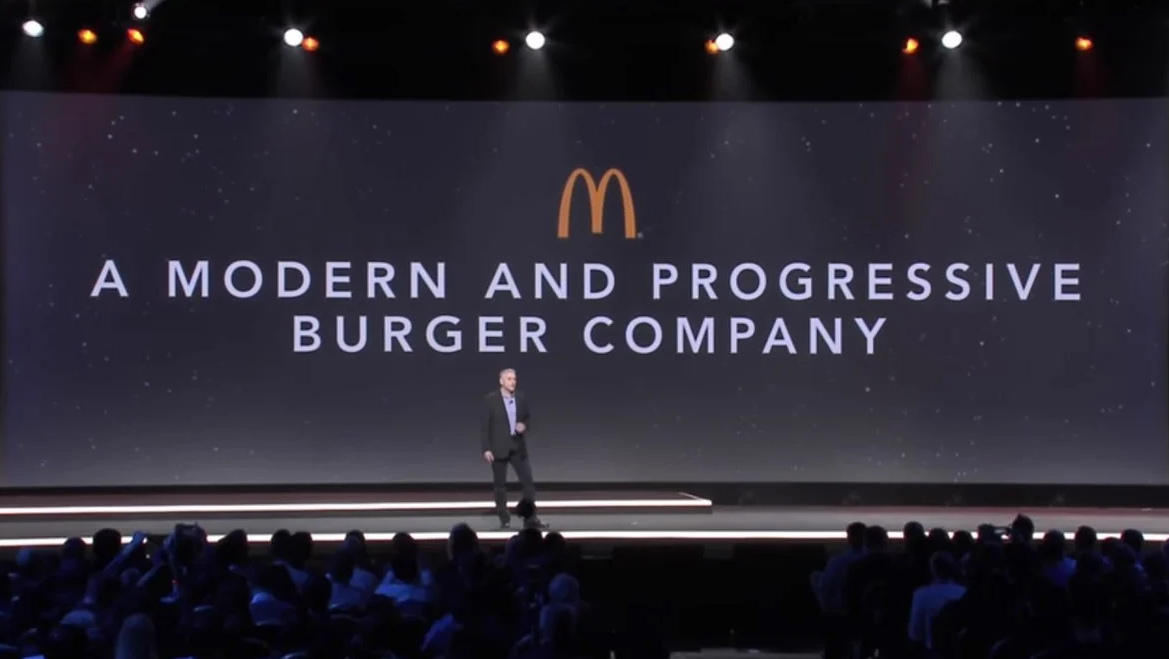
There is something kind of fascinating about the aimless, erratic advertising output of a brand I would describe as “final-stage.” Everybody in the world already knows about Coke or whatever, so instead of burning airtime explaining the product these companies' ad wings can spend their day working on stuff like making the orange M&M bisexual. It's the type of fucking around to stay busy you do when you've done every quest and unlocked every upgrade in a video game. Food brands, whose products we literally depend on for sustenance, are by and large final-stage brands.
I've written already about the poisonous, hollow desperation of our culture's pivot to endless nostalgia. Just a few weeks ago, Kaleb Horton wrote about it better:
Memory is sex and nostalgia is pornography. You can do incredible things with memory, grow and love and learn from your mistakes, find reasons to live, but with nostalgia all you can really do is get a little closer to the grave and buy something about it.
The latest route capital has been running is to just remind you of a thing you've seen before; yanking a chain of neurons that must have aided a key ancestor in remembering which berries give you diarrhea and bending them to instead light up when we encounter the words “Cool Ranch” or “Cinnamon Toast Crunch.” This, it should go without saying, is a cheap trick and a nasty practice; nonetheless it seems to be paying out. Anywhere you go now you are subjected to looking at candy-based soda, food-based candy, snack-based food, food-based snacks.

The Cup Noodle Funyuns are actually pretty good. Collage: Me
I think the nostalgia thing is only one of a few factors that have fed this algae-bloom of cross-branding. For one, I firmly believe that we have made it too easy to make products. The ever-tightening global supply chain is now so frictionless that any stupid idea with sufficient money signed on can be available at Walmart within like four months of being thought of, and there's not even any pressure to make it good, because a) it'll be nebulously “Limited Edition” or just mailed directly to select Instagram freaks, and b) the more outrageous it is in concept the less the execution matters. Made you look! No need for your other senses!
This kind of gimmick marketing has been around, especially aimed at kids. The difference I'm talking about here is that in the ‘90s and ‘00s it was always concept-driven: a burger with generic, archetypical macaroni on it rather than one where the brand of macaroni is the point of the venture. (I'm excluding the perennial tie-in breakfast cereal here just because it's so easy to make new cereal shapes that they've been doing it for decades already.)
Another factor is the rampant financialization of all things; private-equity ghouls scooping up legacy brands and stripping them for parts, ruining the lives of countless regular people who used to work there, shifting the goal condition from “selling a product” to “making money by the easiest means” even for the businesses too big to be zombified. The shiniest knife in the corporate butcher's kit is licensing: you can make money lending a name or a logo to somebody else and you don't even have to do any of the work. Anybody with the licensing rights to anything remotely notable probably signed off on an NFT, a Funko, or both in the last five years. And I mean remotely—please treat yourself to the absolutely dystopian copy on the website for “Mini Brands,” which have turned into a playground commodity such thrilling products as packing tape and sunscreen.

I'll trade you a Miracle Whip and a first-edition Hefty ForceFlex for your, uh, is that a box of Crystal Light packets? Photo: eBay
Finally, I think the key motivator is the death of 20th-century-style advertising—TV and print are floundering, and even standard online ads nowadays (banners, pre-roll videos) are either blocked by the end user or just bounce off a saturated mind. The last big discovery in ads, the Old Spice-esque zany comedy sketch, is starting to go stale now that everyone has been going all-in for fifteen years (it should be illegal to run commercials for insurance like it is with cigarettes). Advertising has had to go incognito to keep fulfilling its mission, posing as TikToks and review videos and #relatable posts and—in a synethesis beyond Madison Avenue's coked-uppest imaginings—products themselves. Pivoting from a burger which is merely tasty and promoted as such to a burger with Frito-Lay® Flamin' Hot™ flavor dust blasted over the bun designed to compel a bunch of deeply weird guys to livestream about it from their parked cars. You don't even have to pay those guys! They do it for free!
My distaste should be clear for pointing-and-smiling culture. It's unoriginal at best and insidious at worst; Alf back in Pog form, et cetera. But my distaste becomes alarm when the cheap “remember this” trick manifests as something you are ostensibly meant to eat and put inside your real human body.

Photo: National Hog Farmer
I don't even think it's morally wrong to eat fast or processed or mass-marketed food. It's not good, yeah, but it's widely available and it's part (or maybe the whole) of American culture. But when you're eating, say, Hormel bacon infused with “CinnaDust™” you're eating something that, unlike most food throughout Earth's history, is not really meant to be eaten. It was concieved and brought to market so people would say “haha how weird” online and put the name “Hormel” in front of your eyes; it can achieve this goal without you even buying it. The fact that it's edible at all is just because they already had some bacon lying around—if the marketing team thought they could generate the same buzz by making, like, some paper plates or sending an email they would have done that instead.
The wastefulness and excess of this shouldn't go unnoted. Even if the impact is a small fraction of Hormel's whole factory-farming operation there's no lens through which releasing another ton of CO2 or slaughtering another thousand pigs is worth it to produce a limited run of bacon with crushed-up cereal on it; a product that only exists because it has to exist to be talked about, bought by a small class of influencer rubes and then thrown away minus two or three token pieces eaten on camera. They should just run a press release asking us to shut our eyes and imagine a Mountain Dew-flavored potato chip, thank us for thinking about their products, and let everyone get on with their day.
The co-branded gimmick product is barely a product. The mere fact that it occupies space on your phone screen is more important than any quality of the thing itself. This philosophy is especially troubling to see applied to food, in which we typically value wholesomeness or at least enjoyability. But this stuff isn't really food—it's content. And you deserve better than to eat content.
11.12.24
Compuary Rain
For the first almost-a-year after I moved to Pittsburgh I worked in a screen shop. Mike Abrusci has called screen printing "vaguely skilled labor that can be completed by almost every kind of low life," and I think that's the best pitch. It's slightly better than, I dunno, digging trenches, but it's not nearly as creatively interesting as me and my fresh BFA were hoping, and it's usually either extremely stressful or insanely boring.
One ten-hour day while folding and boxing a thousand bootleg Steelers hoodies I started to write a really stupid piece of dialogue in my head. I think I initially envisioned it as the opening narration to a video game but when I got home I typed it up and made a fake book cover.

That is my hand and sleeve, although I couldn't tell you what book I'm holding in the original photo.
The mockup doesn't look that good, which is fine. The text is obviously aliased and looks weird in a way offset printing does not. The robot-hand-with-gun is cut out of a random paperback I found on archive.org, and anyway, that style of handpainted illustration would have been too expensive for this kind of book where everything else is digitally set. The ISBN sticker is from Brute Orbits by George Zebrowski, which I've never read. (A few people have looked up the barcode and misidentified this book as Brute Orbits; I should ask them if they liked it.)
I posted it on Twitter and it did middlingly. To date it's got about 500 faves, which ain't nothing. I think almost everyone who saw it right away understood that I made this thing up to make myself laugh. "Baltimore Airport" as a character name is straight out of a goof my girlfriend and I like to do where we offer a handshake and introduce ourselves as a two-word vaguely-namelike phrase the other just said.
It's a stupid and shallow thing to think about but I sometimes wonder what the sum of my impact on the Internet looks like. Online is such a hyperdense system of stuff getting passed around and recontextualized and signatures being cropped off that happening upon your own creation feels like sticking a letter in a bottle, tossing it into the ocean, then flying to a different continent and finding your barnacled note washed up waiting for you.
I've made a few things that people have connected with online. I posted a grid of awful names for different permutations of Mountain Dew and liquor that led to multiple Twitch streamers forcing themselves to try every one. I drew this sticker when I was 13 that you may have seen on a laptop somewhere, or seen one of the hundreds of charming bootlegs of. In a way totally removed from delusions of clout (none of these things ever changed my real life at all) I think it's kind of neat to consider one's furthest-reaching contributions to the internet; to comb the beach for a JPEG-encrusted bottle with your name in it and try to work out what currents brought it there.
After this fake book's decent Twitter performance it seems to have spread without my knowledge between people who are big fans of cyberpunk as a movement. Someone sent me a dramatic reading of it that I simply love. Cohost really liked it, probably owing to the higher partial pressure of furries and computer geeks (affectionate) that made up its userbase.
More than one person has tracked down the original post and sent me an extremely polite email asking if I remember the book's title, and I have admitted to them that I made it up and it doesn't really exist. I think posting absurdist fake stuff is funny but I will break kayfabe to save somebody a bunch of frustrating research in a case where I am in fact the wild goose.
But some people don't even do the research, meaning that not only do they never learn the truth but I never learn they were looking. Every new place this image gets uploaded is another step somebody has to trace to connect my name to it, and that's a chore. Here's a Reddit thread where people are debating whether it's real and trying to find it, including one guy who claims it's a photo of a real book but written as a parody, which is flattering.
Sometimes people who figure out I wrote it tell me I should get to work on a whole book, thinking that it will keep being funny for longer than a page. I would never ask someone to write a book, which seems like an enormous hassle, but I assume most of them are kidding.
Anyway, yesterday I logged on to Tumblr for the first time in a couple weeks (I briefly tried using Tumblr in earnest again when Twitter was starting to crumble but I have basically abandoned it again since) and several people had tagged me in the comments of a post where the very talented user @thebyrchentwigges wrote a short excerpt from my stupid book I made up. I'm going to mirror it here for ease of reading:
Level 3 of the Dirt District wasn’t the worst. You needed a clean record to work there, what with all the hydroponics. When I’d been little, Maa had forced me to do my learntablet. On it, all the pics of the hydroponics were bright and clean, white and green. The reality was a lot cruddier. But that was Circuit City for you.
I eased through the back of a grow area, heady with the smells of plants and processed shit. I knew the right panel to press in the moldy, yellowing wall to open a door. Air hissed around it. I slid my shoulders inside and pulled it shut.
“Glad you could make it, stud,” creaked Crusty. The dim light caught her sparse silver hair and her walker, made her piercings and studs sparkle. She hunched over a laptop jacked into the room’s servers. Two shadows guarded her. This space had been Crusty Silverware’s lair since Compuary started, for computer reasons. I couldn’t keep track of that cyber-shit. Good thing the jacket liked me.
When Crusty’d been paid for a haul with the bio-optimised, techlive jacket ten cyberyears back, she’d cursed. It hadn’t activated for her, or for her lead associates at the time. Not for Ramirez, not for forty-three other hackers and dirt rats. One daycycle, after I’d shanked the right person for Crusty, it was my turn to try.
Turned out my Maa was right when she said I was born after an Omnibiotics exec helped himself to her. His genetrace unlocked the jacket for me. And made me all the more determined to fuck up Crystal City, Consolidated Omnibiotics, and PresCops Harvard Pubence.
Crusty had a new piece of tech today. With tweezers, she held up a small plass envelope. A chip was sealed inside, sparked with a red LED. “This,” Crusty said, “is our ticket for the 9th Annual Pervert's Ball. And I’m a broke buñuelo after getting it. So we’d better close that contract and earn that bounty for sending ol’ Harv Pubence to his factory reset.”
Our ticket? Uh-oh. I bluffed, “You like a party, right?”
Crusty made a pfffft sound. “The Pervs Ball isn’t for me, stud. After a hundred and twenty years of this crap, I got a face for radio.” Crusty ran a finger down the steel hoops edging one ear. “This is your ticket, Killblade.”
I looked over at the two shadows. Ramirez stepped up. Zie made the 'Net open and the AI dumb down when we needed it. Talent took a toll on zem. By zeir stance, the Tums 2 hadn’t kicked in yet. Arms crossed, zie huffed, “You’ve got a gender. A libido, even.”
“I mean, it is a ball for perverts. There’s perverts who’d love it that you don’t have either,” I said.
“Please, no,” Ramirez said. Zie ignored me to tell Crusty, “I’ve already codejacked the invite to get her in. Plus she’s got the jacket.”
I flexed my shoulders under the jacket’s pewter bioleather. The jacket purred empathetically, broadened at my shoulders, hugged my waist a little more. Its ionic field, blocking toxins and microbes and UV radiation, felt like a wearable sparkle. When I needed to punch someone out, the bioleather would thicken into armour. I pressed a cuff button so it wouldn’t play subliminal soundwaves or exhale pheromones right this second.
The second shadow behind Crusty slipped forward. Baltimore Airport hadn’t said anything. She rarely did. But she chose this moment to brush back a lock of cyan hair, shift her long, long legs. Every cool, elegant move of hers trapped my eye. Was it that my Dirt District nerves knew how fatal she could be? Or that she’d been engineered to draw every gaze, whether she liked it or not? Made to be beautiful and used, diverted to be a killing machine, escaping that for the risky refuge of Crusty’s crew.
All she really wanted, she told me once, was to see the ocean.
Her midnight eyes met mine. Eye contact that hit me like a dose of NitroNerve. She said, quietly, “I’ll go with you.”
We both knew what that meant, for the Pervert’s Ball.
Her courage made me reel. I swallowed. All I could say was, “I’ll protect you. Until it’s time.”
Time for the kill.
I turned to Crusty and Ramirez. “We need one more. For security.”
Ramirez asked, “Got anyone? Because I sure don’t.”
I tapped the sleeve of the jacket. Its hypercom link came alive. “Maybe.”
They weren’t in this room. Yet. How much did I trust them? I wasn’t sure. But they wanted to take down Harvard Pubence more than anyone. Even me.
This is so sick, to me. it's utterly beyond the typical sort of piggyback riff you get on a post like this. It's art. The idea that Crusty Silverware got that nickname for having a ton of piercings is so good. "Circuit City's coolest jacket" being actually cool and important and not just a regular-ass denim jacket like I was picturing is so sick. The expansion of the "Ninth Annual Perverts' Ball" into something with known stakes and rules rather than an intentionally-hamfisted name a dumb guy would come up with is amazing. In about one sentence each, every character is rendered as more real and interesting than my dumb ass could pull off even if I was earnestly trying. This person has taken a concept I wrote up as a back cover because I did not think it could stand being any longer and made something that genuinely makes me want to hear more.
Anyway. I guess the point of this blog is that sometimes, when the right series of coincidences happen, posting online can result in something good. Hopefully if you're reading this because you Google Imaged my dumb fake book you know the truth.
01.22.24
Nostalgia Poisoning
There is probably some wisp of truth, at certain times in history, to the idea that the first part of someone's life was better than the later chapters. Maybe your coming-of-age years coincide with the outbreak of a world war, or a society-redefining diaster of another type.
The world changes for various reasons, and people caught in the churn will inevitably prefer the familiar and comforting to the new and hostile. This is a fine and normal thing to do. I'm not here to fault the guys digging trenches at Verdun for wishing they could be back on the family farm. People put in these situations know intrinsically that they will never be the same; that this trauma has altered something within them that only rolling back time could restore.
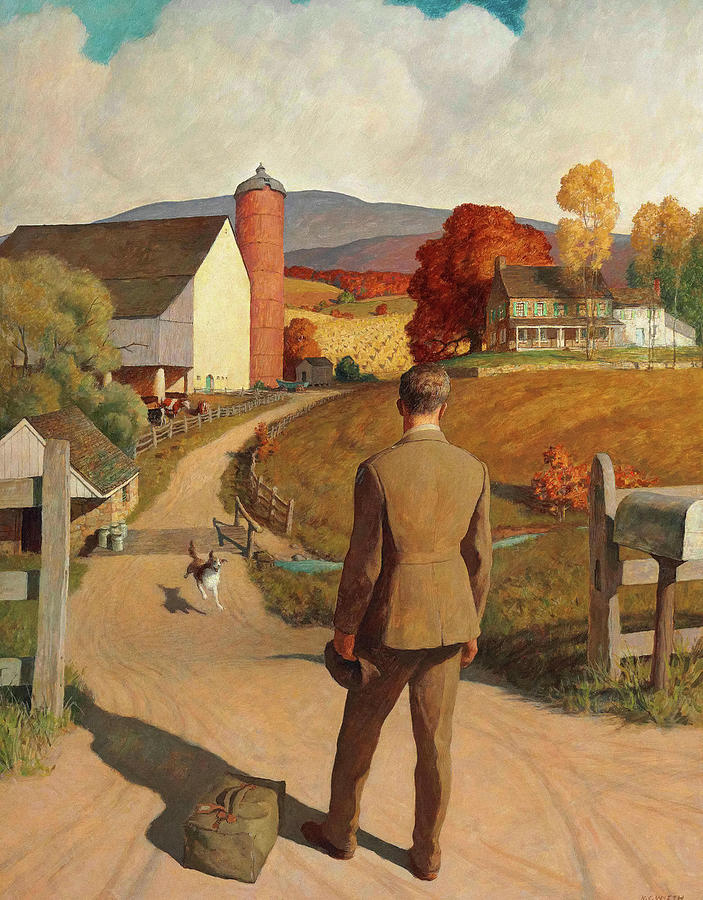
The Homecoming, N.C. Wyeth, 1945. Fine Art America
But this is not what Americans my age talk about when they wax nostalgic. While it is true that in the "Western world," things have been on a gradual slide downward for the poorest 90% of people, the same neoliberal façade of history being settled has stood for basically the whole lives of people born around the turn of the millennium. And it's held true, at least here in the imperial core, where not even a massively deadly pandemic was really enough to clog up the gears of going to work and paying your bills for more than a few months. The inertia of American society and culture Being Like This (by which I mean an endless circus demanding the clamoring masses look the other way while capitalism poisons and kills us) is overwhelming; perhaps it will not truly falter until the final hour when the one percent retreat into their bunkers and the cities crumble into the sea.
This is why it comes off as absurd when 30-year-old guys from the suburbs post about the Nintendo 64 like it was the Garden of Babylon.
I think it's sort of silly to be a young person in 2024 griping that you were "born in the wrong generation" because you like Jimi Hendrix or whatever. You live in a time where every song he ever performed is available instantly, for free, and where you can buy weed-infused Nerds Rope at the corner store one thousand times stronger and more pleasant than anything sold or smoked in his entire lifetime. What are you complaining about?
I think it's exponentially more silly to be a young-ish person in 2024 griping that you miss, like, 2003. What, you liked the GameCube? Your parents probably still have it, or you can install Dolphin and play every game ever published for it in crisp 1080p.

Kirby Air Ride looks great in HD, by the way. My screenshot / Dolphin Emulator
There's nothing about a 90s or 2000's childhood—at least materially—that isn't still around or even easier to get. If you're really fiending for some Gushers, I have great news: They still make them, and there's nobody legally appointed to stop you from eating a whole box for dinner. (I have done this, at a low point in my life, while also watching the 2000 Gary Sinise movie Mission to Mars. It holds up in a campy way.)
But if just having the same readily-haveable stuff was the key to recapturing that vague childhood bliss, the world would be full of adults blowing their paychecks on Home Alone 2-esque mounds of ice cream and candy. This probably does happen sometimes, but by and large we are not a society of little Caligulas storming the poor guy at Target who guards the Pokémon cards.
A few months ago there was a tweet going viral that I can't be bothered to dig up now. It was basically some 30-something software engineer mourning the fallen world he used to know and advocating vaguely for "reclaiming" it in dangerously similar terms to much more deranged Twitter users who post about like, marble statues and seeking a child bride to read the Bible to. Attached to this post were some very funny images I would classify as "Nickelodeon Gak Norman Rockwell:" two kids in matching pajamas play their new Nintendo 64 in a Christmas-tree-lit living room drenched in deep jewel tones; a mom in light-wash jeans serves her smiling nuclear family a heaping platter of Peggy Hill-ass mid-looking spaghetti.
the good things i like about 90s is there were no hipsters, no rap, and your odds of getting an infection at a hospital were slightly higher
— wint (@dril) April 30, 2013
Substitute tweet I did remember the keywords for.
Nostalgia for past decades continues to utterly dominate our culture, to an extent that is arguably suffocating new ideas. No field of art is being meaningfully advanced by a $200 million Ghostbusters movie with the general half-assed vibe of Playstation DLC. It serves basically nobody that you can buy a plush ALF (4 seasons, ended in 1990) at Barnes & Noble or top up your coffee with Friends (10 seasons, ended in 2004) creamer.

For reasons known only to Warner Bros. Entertainment, Inc. and God, this is just one of three Friends-branded foods I could have cited. Brand Eating
There are various reasons for this, mostly fiscal. As streaming, YouTube, and video games continue to erode the once-monolithic audience for major movies and TV shows, the accountants and strategists in control of what gets made and marketed have come to fear risking a dollar they might not make back on something new when something old—something people already know about because it was a winning bet 30 years ago—is right there, and they still have all the trademarks filed.
This is just the expected behavior of corporations, those Strossian alien beasts to whom we've accidentally entrusted the keys to the entire world, acting in the ways they always will. It's obnoxious, but it's hardly interesting.
What's more interesting is the way we've mistaken this corporate cowardice for our own problems, seamlessly adapted the whims of Universal Studios to answer our own personal dissatisfaction. This is a misinterpretation of what's actually different between then and now.
The thing you miss about being a kid isn't the specific flavor of GoGurt or the specific aesthetic of Neopets or even the general culture of [insert decade]. It's the fact that when you were a child your material needs were taken care of in the interest of giving you time to goof off and socialize. The thing you hate about being an adult today isn't the absence of said yogurt tube and/or role-playing website. It's that your life is dominated by squeezing a right to live from a system opposed to you living, in much the same way as you might once have squeezed the last of the yogurt from the fabled tube.

Group of "breaker boys" employed processing coal, Pittston, Pennsylvania, 1911. Lewis Hine / Library of Congress
Childhood wasn't an institution until pretty recently, in the big picture. Kids were going to work—doing the same shitty and dangerous work as adults and sometimes even worse jobs too delicate for larger bodies—until the midcentury, when an expanding middle class standardized going to school five days a week. Even now we lack a complete grasp of the relationship between the conditions of someone's childhood and their adult psychological profile, besides the accepted theory that it's causal and permanent. With no primary evidence, I'm going to guess that the generations of kids who crawled through coal tunnels or lost fingers to mechanical looms in the 1870s didn't then spend the 1890s sighing about how much better things used to be while snacking on a box of 19th-century Gushers, which I imagine to be a sort of cured beef nugget filled with cocaine.
Which is not to say—please do not quote me as saying!—that the era of legal and widespread child labor produced better-adjusted adults. Even if children continue to face hardship and trauma, it's a social triumph that we generally prioritize education and leisure over rising and grinding between the ages of zero and eighteen. The tragedy is that we don't continue to prioritize these things for our whole lives.
When people wistfully recall their early years, the fixation on specific products or media properties is a misdirect, a corporate-planted fill-in that can never heal the void. What we truly miss—what the borderline-vestigial class-consciousness center of the American brain is too shriveled and starved to express—is living in a world that is designed to suit our needs, rather than the adult world of unkillable machines built to commidify, impoverish, and as soon as we outlive our usefulness kill us. As one of the only passages of Marx I can remember any of goes:
The lowest and the only necessary wage rate is that providing for the subsistence of the worker for the duration of his work and as much more as is necessary for him to support a family and for the race of laborers not to die out. The ordinary wage, according to Smith, is the lowest compatible with common humanity, that is, with cattle-like existence.
— Economic and Philosophic Manuscripts of 1844
The false sense that our nostalgia stems from certain video games or snacks or TV shows is both intentionally planted as a diversion and intentionally juiced for profit. It's manufactured demand on a scale both reelingly massive and sickeningly personal. Feel the void created by the contrast between one life where your wants and needs matter and a second life broadly describable as "cattle-like?" Well, check this out: Ecto Cooler is back and we smoothed out Bill Murray's face a little on the can so you don't have to squint as hard to pretend he's not 500 years old.
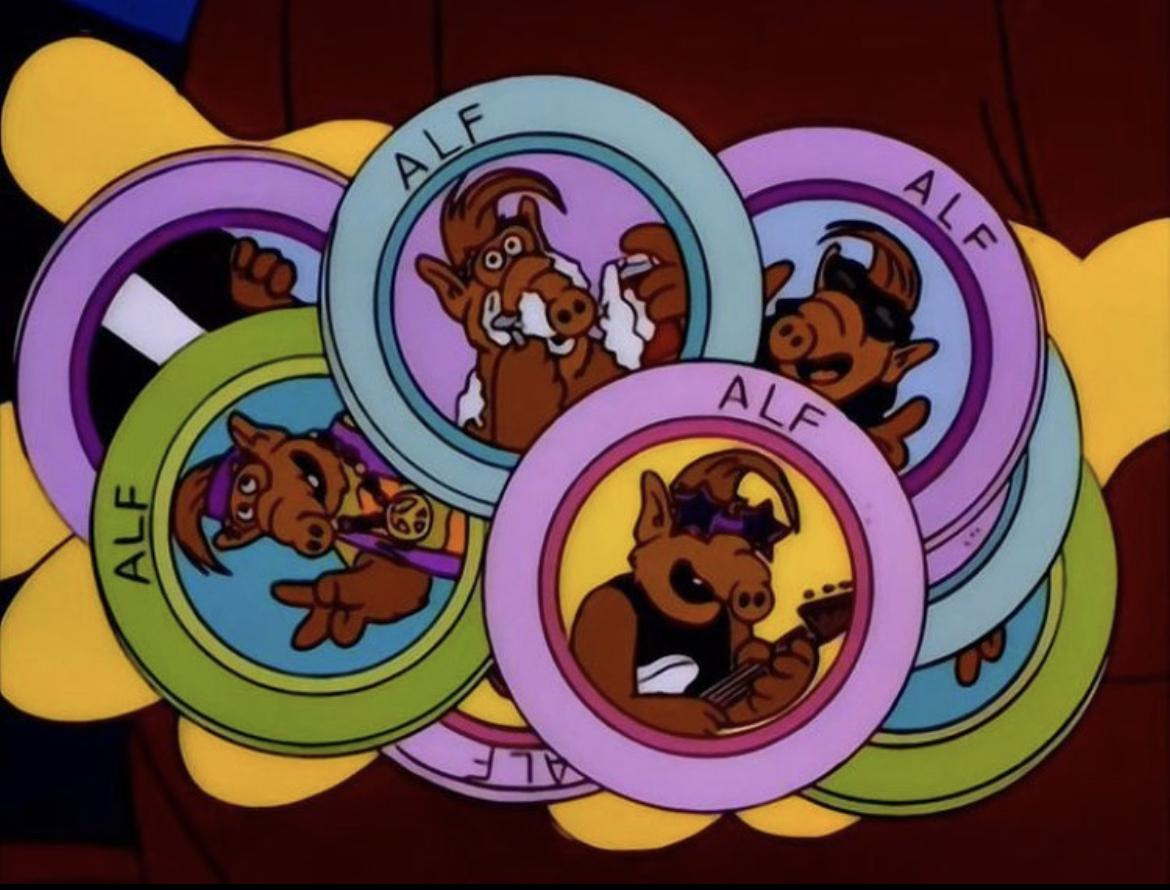
The Simpsons S7E4 / Reddit
In a sense, the delineation of childhood as a period when people deserve protection and care represents a small and hard-won victory against capitalism by humans; a sort of fireline before which our bodies and minds shouldn't be exploited, but after which we are hurled into the cogs as the markets demand. And that is where, within this partial measure of kindness, lies a deep cruelty. Modern childhood is a glimpse of the world as it could be, one where the physical welfare of human beings is the primary goal. For all your parents' flaws, they were trying their best to feed and house you. For all the education system's flaws, it was giving you a social venue and some starter knowledge. Once these two entities release you, every authority you encounter for the rest of your life is trying to scam, indenture, or outright rob you in service of inhuman, incomprehensible concepts like "quarterly earnings" or "a rising rent market" or "giving a foreign ally billions of dollars to do genocide with." Arguments about maturity aside, who wouldn't forgive us—thrust blind and clueless into the wasteland of late capitalism—for reminiscing about the comforts of the bunker?
A world where the protected status of childhood lasts our whole lives is a world much like the utopian visions of the radical anarchists; a world founded on the basic right of all people to not just survive but to enjoy living. Imagine a post-capitalist society where labor has been dethroned as the point of existence by things like self-discovery and creativity. If you belong to a certain privileged bracket, you may fondly recall the early weeks of the 2020 quarantine when people were spending their newly-afforded free time experimenting with hobbies and reading books and going outside. I like to picture a future society that feels a lot like that but without the prerequisite condition of thousands of people dying preventably. It's a vision that long predates covid, obviously. As the womens' rights movement of a hundred years ago sang:
As we come marching, marching, we bring the greater days.
The rising of the women means the rising of the race.
No more the drudge and idler — ten that toil where one reposes,
But a sharing of life’s glories: Bread and roses! Bread and roses!
James Oppenheim, Bread and Roses, 1911
The raw materials exist for a society where we are free to continue learning and growing and for our whole natural lives, not just the chapter when our bodies are still growing. A world like the one you remember—not just in its neon-splattered trappings, but in its fundamental spirit—can be built. The only people stopping us from building it are the ones selling you fucking Friends creamer.
09.22.23
UFOlogy: An American Folklore
I have been fascinated with stories of alien abduction and UFOs for a long time. I think the questions attached to these topics—whether Earth is the only living planet in a dead universe, whether our human perception of reality is accurate, et cetera—are genuinely interesting and worth pondering.
I think something weird seems to be repeatedly happening (to people and in the sky) and that the extraterrestrial hypothesis to explain this thing is just as valid as any other guess. I do not personally think that the sum total of evidence for this hypothesis is compelling, and I do not personally believe that extraterrestrial beings are routinely visiting Earth and picking up random people and sampling cows' spinal fluid and the like.
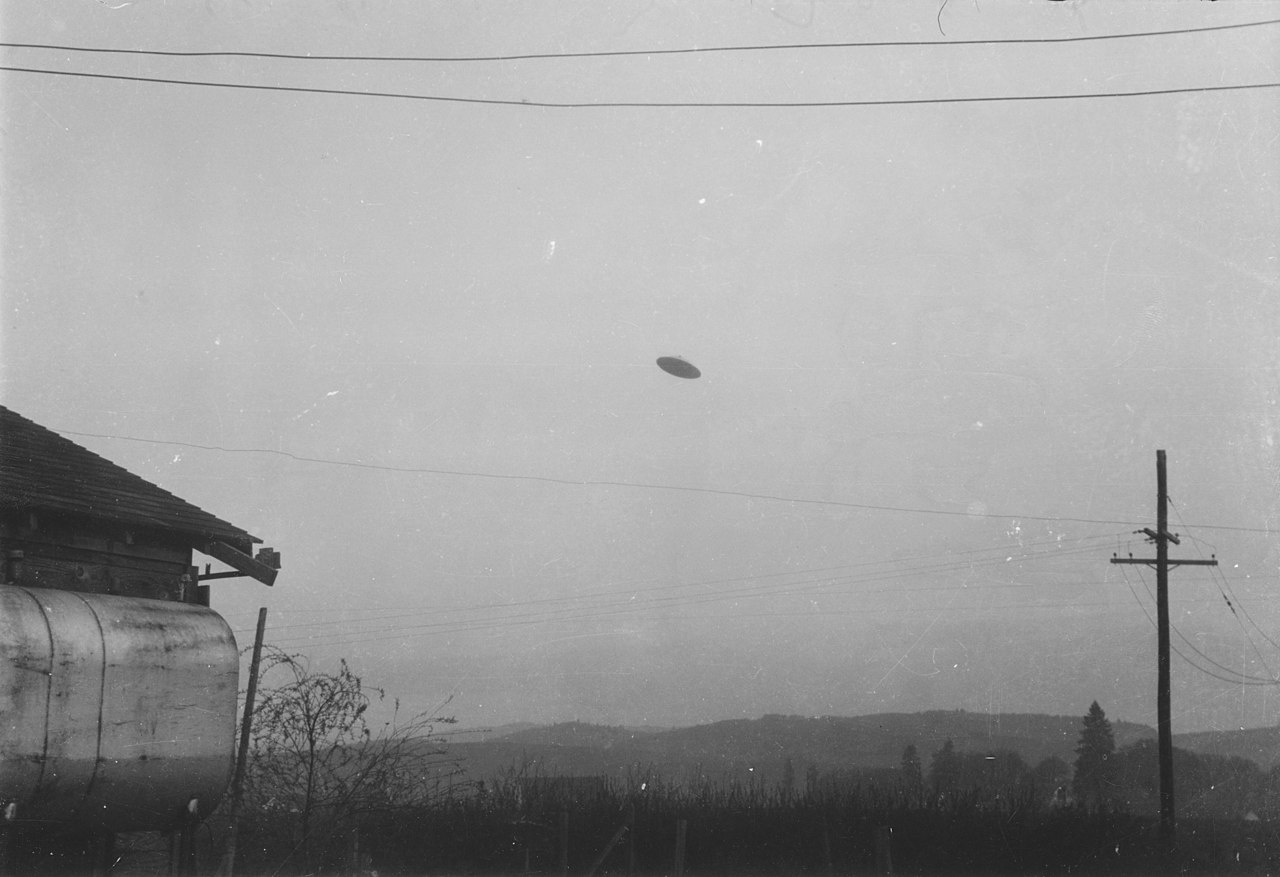
Alleged UFO photographed by Paul Trent in McMinnville, Oregon, 1950. Wikimedia
People see weird objects in the sky. People report bizarre experiences involving sort-of-human creatures performing vaguely medical rituals. There are commonalities between these stories: UFOs tend to be disc- or cigar-shaped, the aliens are short with large heads and eyes. This network of commonalities can be read in two ways, depending on your prior beliefs. They might expose a standard mode of operation employed by a unified alien presence; peeks at the manual followed by myriad agents of an extraterrestrial civilization with unknowable motives and immense technological power. Or, they could suggest a cultural staple built over the last century in the collective subconscious and borrowed from to patch over the effects of something strange but completely earthly.
I've been reading Abduction by John E Mack, M.D.—here's an interview he did with PBS on the topic perfectly preserved since 1996—a book which compiles dozens of stories Mack has collected from people who sought his psychiatric help for trauma they believed to be related to an alien abduction. I have a lot of respect for his approach, which is in turn respectful to these people and their stories. They believe, often with such conviction that it ruins their lives, that they've had an encounter with alien beings. While occasional hucksters are found out, the bulk of abductees have nothing to gain by sharing their stories—many of them lose relationships, jobs and social status for it. People who don't truly believe something happened wouldn't sacrifice to defend its veracity.
My interest in UFOlogy and the alien phenomenon doesn't hinge on whether it's real, and if I had to guess I would say it isn't. I am fascinated by the anthropological bedding of the UFO phenomenon; the existence of extraterrestrials (and Bigfoot, Mothman, your personal favorite cryptid or ghost) as a sort of American folklore.
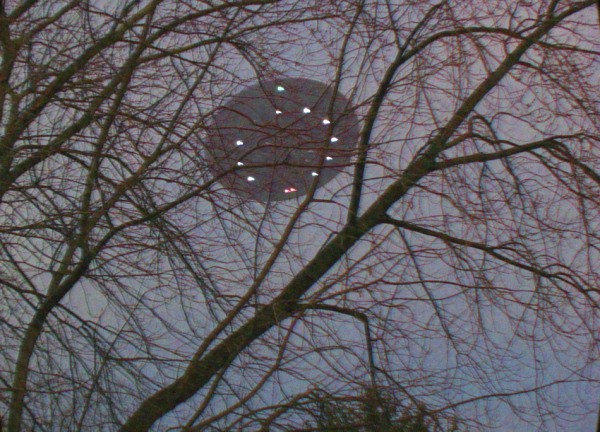
Photo taken by Jack Nethering, Green Bay, Wisconsin, 2007. The Black Vault
In my first year of college I took an introductory astronomy class. The professor, knowing that a lot of kids would get their required science credit and then never take another science class, required us to read Carl Sagan's book The Demon-Haunted World. Parts of the book feel a little stuffy now (chapter 2 cites Beavis and Butthead as a red flag of humanity's decline) but I think it presents a highly compelling argument for skepticism toward pseudoscience and, at the same time, a convincing case for accepting our inability to change another person's beliefs. Some people will believe in something unfounded, and some people will do so with a life-ruining grip.
I'm not suggesting that humanity has a complete understanding of our world. Strange, unexplainable things happen all the time! What I think is most revelatory, though, is the nature of people's reactions to these events, which are almost always reinforcing of a previously-held belief or assumption. The human mind is so fixated on the maintenance of a continuous narrative—that narrative being so critical to our experience of consciousness—that any gap needs to be filled as a matter of self-preservation. Whatever is happening to people that causes lost-time events or gaps in memory is probably weird and scary! We understand so little about the mechanics of our own consciousness that even questions like how anesthesia works remain a mystery after almost two hundred years of using it worldwide. The conscious mind can react to trauma in a variety of ways we sort of understand: suppression, dissociation, reinterpretation. In Abduction, Mack examines a link between alien abduction and abuse in childhood. My belief is that when the human brain needs to fill a empty space in our personal story—left by either the blotting out of a traumatic event or by accident, such as sleep paralysis—it will reach for material absorbed from the ambient culture. Before space travel or even other planets were widely known of, people backfilled these blanks with simpler myths. Sagan writes:
Abductees frequently report having seen 'aliens' in their childhood - coming in through the window or from under the bed or out of the closet. But everywhere in the world children report similar stories, with fairies, elves, brownies, ghosts, goblins, witches, imps and a rich variety of imaginary 'friends'. Are we to imagine two different groups of children, one that sees imaginary earthly beings and the other that sees genuine extraterrestrials? Isn't it more reasonable that both groups are seeing, or hallucinating, the same thing?
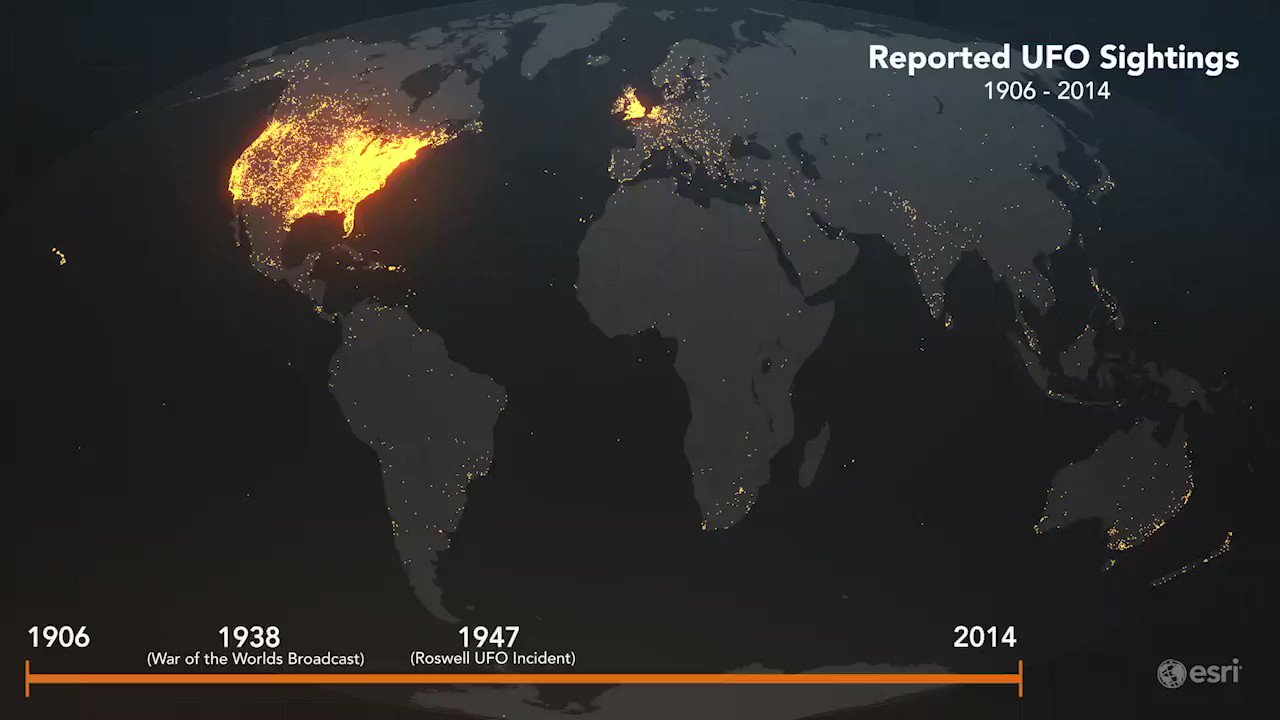
Map of UFO sightings worldwide since 1906. Esri / ArcGIS
A reaction based on ambient cultural absorption would explain why the UFO phenomenon is so deeply American. Other countries' reports of alien encounters come from a modern world subjected to America's cultural radiation through empire and trade. The alleged UFO crash at Roswell in 1947 coincides neatly with the beginning of the Cold War; the UFO phenomenon's cultural weight decays throughout the 20th century as our collective paranoia changes targets. A mythology, or family of mythologies, develops: The government is aware of aliens, or is in a contract with them, or is in possession of crashed spacecraft. The extraterrestrials are here to warn us about impending global destruction, or raise us to a higher level of cosmic understanding, or enact a hybrid-breeding program to save either our species or theirs.
All of this is, of course, spun up from white noise. Fake documents spring up concerning the mysterious "Majestic 12," which becomes the center of its own cluster of myths and lore about the aliens' purpose on Earth and the role of our government in dealing with them. Photographs are fabricated for fame or just for kicks by all sorts of people; these harmless hoaxes are chummed up by the uncritical into a patchwork of supposed evidence which always seems to serve their own angle or agenda. And the end result—a network of beliefs and convictions that has survived a drought of real proof for generations—resembles, in its own cheap and garish way, an American mythology. A faith. A folklore.
The earliest sighting of a UFO (at least according to UFO Casebook, one of the world's best websites) was reported in 1876. John Martin was out hunting near Denison in northeastern Texas when he saw a large, dark orb zoom overhead. He told the local newspaper that "it resembled, as well as he could judge at such a distance, a balloon, which seemed to him to be the most reasonable solution."
Critically, Martin did not assert in any way that the object could have been alien or otherwise supernatural in origin. He was characterized as "a gentleman of undoubted veracity," and his best explanation was based on things he knew to be real, even if it was improbable that a balloon was being flown over a frontier town. The assumption that Martin saw an alien spacecraft (a "UFO" in the colloquial sense, rather than just a literally unidentified object) was first published by Maj. Donald Keyhoe, a retired Marine who pivoted from a career in writing science-fiction stories to a career in preaching about the impending alien threat. He is a fascinating figure in the American mythology, and it's difficult to sort out whether he truly believed or just saw a buck to be made.
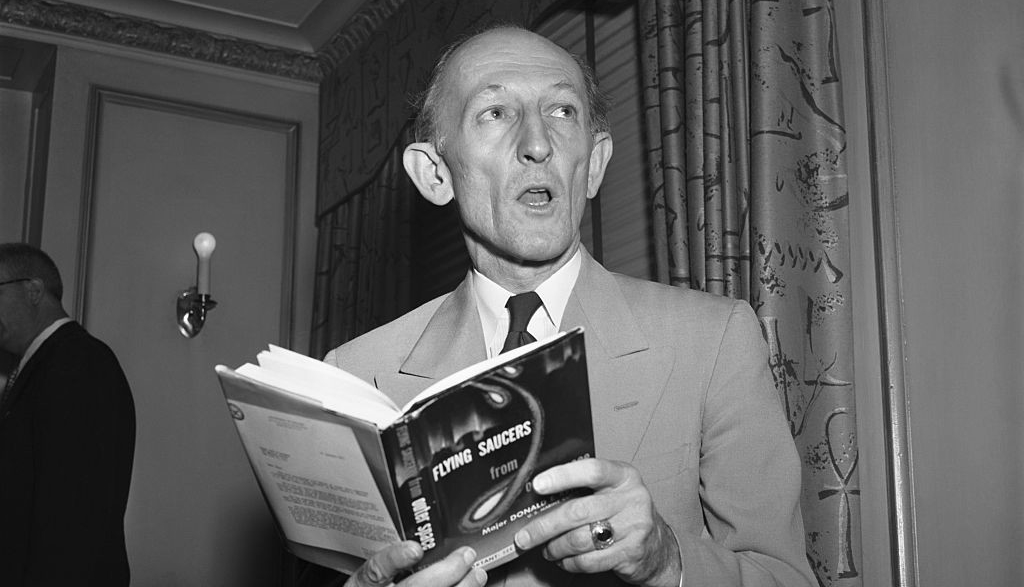
Keyhoe in 1953. Getty
The town of Denison had been founded four years before John Martin's sighting. The land it's built on once belonged to the Wichita, Kiikaapoi, and Tawakoni people, who lived throughout the region. By the 1870s these peoples had been forcibly relocated to "Indian Territory," a shrinking patch of difficult land in an unwanted corner of the expanding United States. They were moved without consideration for any existing attachments to geography: gravesites and monuments were rendered obscure. They were dumped into a new place with no regard for cultural differences. Were they allowed to stay on the ancestral plain that became Grayson County, they may have assigned their own meaning to Martin's mysterious balloon.
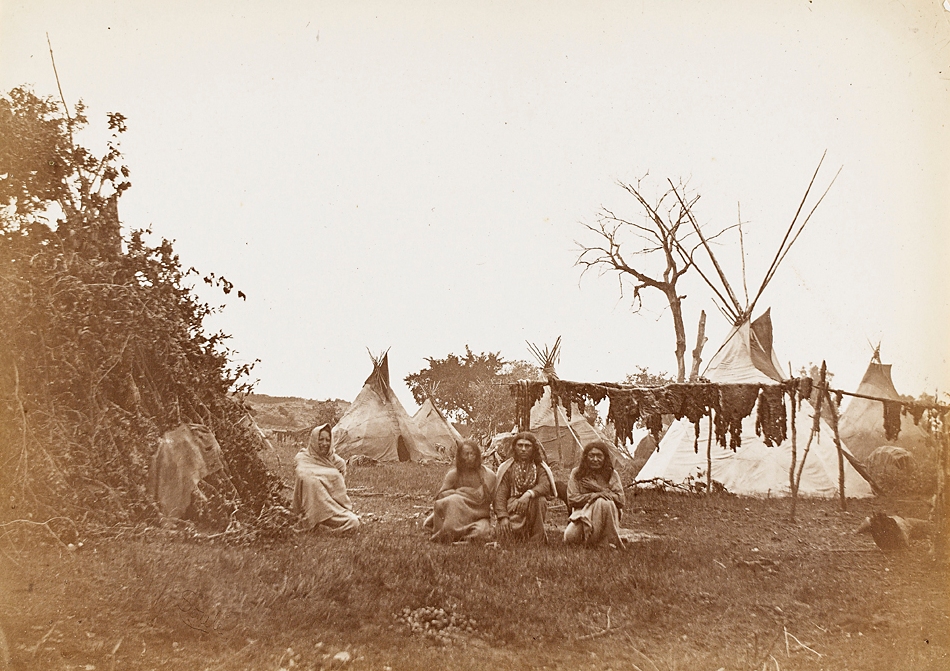
William S. Soule, Arapho camp near Camp Supply, Oklahoma, 1870. Wikimedia
America is built on a mass grave; this we are just beginning to truly reckon with. It is a story written not just in blood but over the erased story of an existing world, now pushed to the margins or only legible between the lines. The theft of this continent from its original inhabitans went beyond the physical realm. An unknowable amount of culture, history, and knowledge was lost forever. It should be a point of shame that the American people are "discovering" from scratch and scattered artifacts the ways of people who still lived here, alongside those artifacts, an archaeological blink ago. They might have told us if we had asked.
Instead, we are left guessing, given an empty hole in history and nothing to go on. And we imitate the behavior of the conscious mind on an expanded scale, packing that void with anything that can be rationalized in any way. Anything that can be leveraged to excuse our being here. The story's provability isn't important; just the justification it can provide. It's the same impulse that leads people to think an exiled Welsh prince sailed to Alabama 300 years before Columbus—a story included in Alabama history textbooks for decades. Or the more fringe belief that Cleopatra and Alexander were buried by a funeral ship of Ptolemaic soldiers thousands of miles from Egypt in the headwaters of the Mississippi for reasons unknowable. On the latter, Jon Bois writes:
A consequence of stealing land is that you will never find the significance of it. Whatever lies you made up to justify your crimes will fade away. There are lots of people who grew up down there in a society that was missing spirit, purpose, anything sacred.
And then there are some who [...] need to assign the sort of historical importance here that they see in Paris, or Addis Ababa, or Bangkok.
It's here in abundance, of course. It's just the history that they choose not to think about.
We killed the spirits of this land when we killed its people. The Americans of the 20th century and beyond inherited a country bleached free of inherent meaning. We dominated this continent by a long, bloody war as a sacrifice to the godhead of science and economics: masters which restrict us from mystery, which streamline away myth. The psychic vacuum left by this destruction has never gone away. Human beings still seek meaning beyond their own lives and bodies, just as the native people did by honoring spirits and communing with nature. America has simply concocted a stand-in folklore infinitely more crude and toxic: Mormonism, scientology, paintings of Jesus as a white guy. Aliens and UFOs.
The extraterrestrial hypothesis as a replacement for religion in the post-Enlightenment psychosphere is not a new identification. "UFO religions" have existed for decades—beginning prominence with the The Chicago Seekers, a Midwestern apocalypse cult whose analysis by social psychologist Leon Festinger coined the phrase "cognitive dissonance." The human mind's all-consuming need to organize a chaotic universe into linear narratives has generally led us to invent a higher power or an unseen plane from which the mortal world is managed. Gods, saints, spirits, karma. When we could not measure the age of the Earth we still theorized about its creation. Some kind of story, no matter how long or complex, needed to span the gap between the current moment and an assumed beginning point.
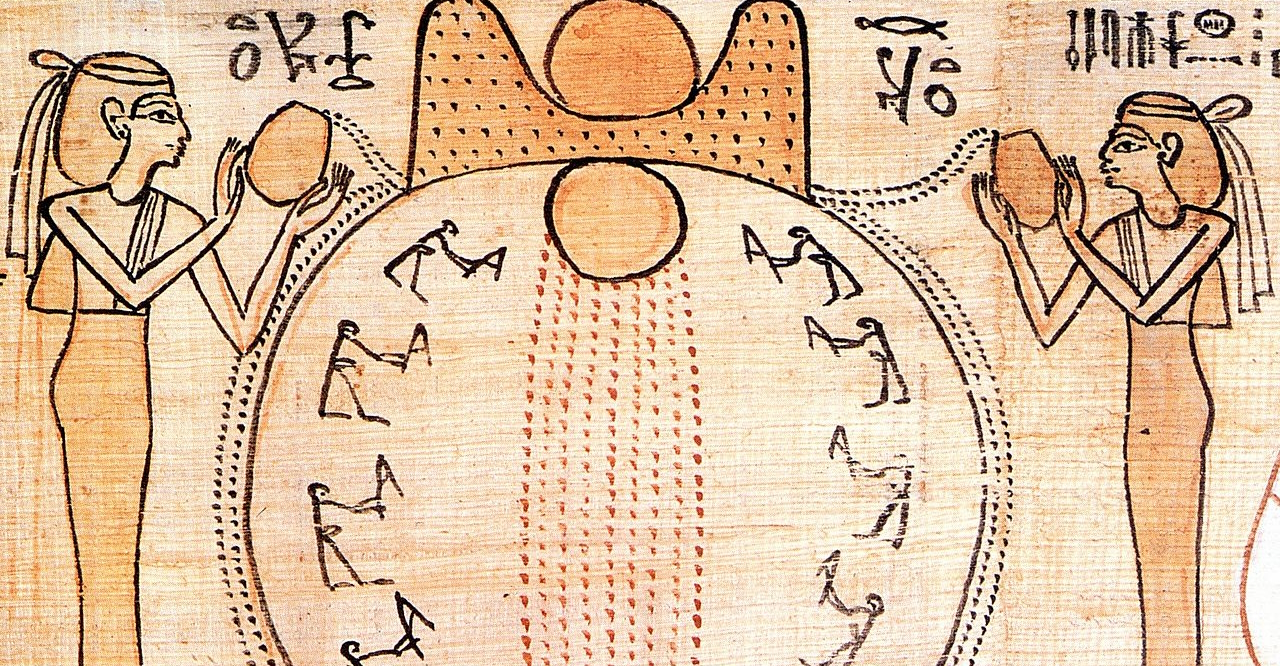
Illustration of goddesses pouring the primeval waters over the mound of creation. Excerpt from the Book of the Dead of Khensumose, 21st dynasty, Egypt. Wikimedia
Of course, no mythology ever ends there. These controlling forces—with their own motives and relationships, sometimes friendly and sometimes hostile—are still all around us, demanding tributes or prayers. Ritual has been a key component of our conscious experience since humans first diverged from apes.
In the American age, when science rules, the big questions which once provided fertile psychic space for mythology have been mostly answered. We know how old the Earth is, where it came from, and even how it will end. And so the realms we imagine and beings who inhabit them take on new forms consistent with our knowledge of reality. Our modern model of the universe—based on physics and chemistry and hard, cold math— does not allow for faeries and sprites, but it does not definitively rule out alien life. There's nothing on the books that says extraterrestrials couldn't be visiting our planet in glowing spacecraft for unclear reasons.
Of course, this mode of thinking inevitably contaminates the past as well. Foundational to modern UFOlogy is Erich von Däniken's Chariots of the Gods?, an incredibly racist text which cobbles together several earlier fringe theories into a thesis that ancient (read: non-white) people could not have built the things we observe them having built without assistance from highly advanced aliens. K.E. Roberts writes on Däniken for We Are The Mutants:
What’s shocking to me, having never read Chariots of the Gods? until now, is how blatantly racist Däniken’s “evidence” [...] is, and how blatantly fascist his happy acceptance of it is. His third and fourth claims are merely contradictory and daft: while completely discounting the role of human imagination in the invention of primitive mythologies and religions, he simultaneously invents, by grand imaginative fiat and seemingly unbeknownst to himself, a new mythology and a new religion.
This is the natural way of religions, to assimilate existing beliefs into their own canon. The Romans renamed the Greek gods and later roped in the Egyptian pantheon. The Christian church turned Pagan equinox festivities into Easter. Keyhoe reinterpreted a mysterious object over Denison, Texas as an alien spaceship. Däniken fudged the bulk of human history to support the idea of alien intervention.
The earliest humans understood, as a matter of intuition, that they were animals: subject to the laws of nature and thus only one part of a greater ecosystem they should take care not to deplete. Anthropologists believe that the earliest religions centered around shamanistic figures who could commune with the other animals and understand their thinking. These people's gods did not hide above the clouds or on other planets. They were the trees, the birds, the auroch; tangible and knowable, yet stil possessing a link to something mystic.
Aliens are the gods of the conquerors. We cannot imagine anything on Earth more powerful than ourselves. But to suppose that we sit atop a pyramid of all creation brings liability, loneliness, confusion. So we imagine something greater than us off Earth. And at the same time, this framework excuses us from guilt: If humans, otherwise just a bunch of apes, inherited our intelligence—our capacity to inflict horror and violence—from extraterrestrial visitors, then none of this is really our fault.
Just like religion has always offered the tormented masses, UFOlogy promises a chance at deliverance. Sometimes this manifests as a literal ride on a comet away from our doomed planet. Sometimes the deliverance is agency; the technology or knowledge to fix things down here. Scenes of global destruction are frequently shown to abductees, seemingly as warnings. In the mythology of alien contact abductees are the new shamans, given special knowledge or unique proximity to the higher plane. A breakthrough is always just around the corner—maybe now, with the Pentagon releasing videos of things they admit they haven't identified, or former intelligence officers testifying that weird stuff is happening, we're about to reach the long-promised Second Coming analogue of UFOlogy: "disclosure." An imagined day or deadline or maybe years-long process wherein the world's governments finally let go of whatever they have, releasing classified information about the existence of "nonhuman intelligence" and the extent of their research programs, and this catalyzes (in many tellings of the tale) a great societal change for the better.
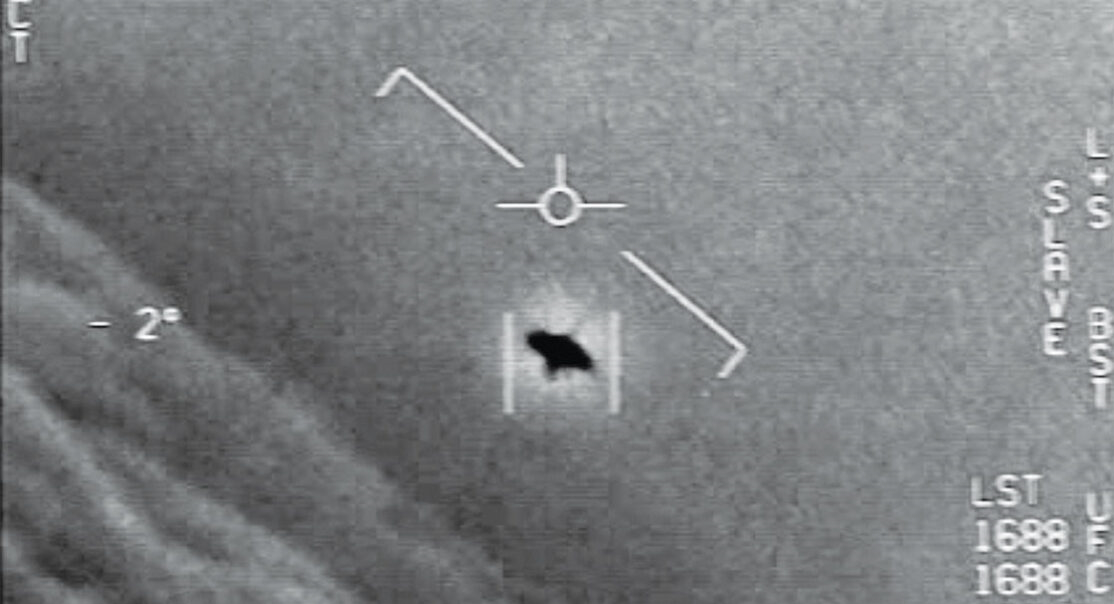
Still from the "Gimbal video," a US Navy video alleging to show a UFO. Department of Defense
The idea of disclosure depends on the possibility that dozens of balkanized agencies of different nations' militaries and governments will suddenly decide, in tandem, to start sharing strategically-valuable knowledge and intel with not just each other but the global public. A version of disclosure satisfying to all believers would include the cooperation of some agencies and groups which only exist in the minds of UFOlogists. What does this sound like but an exercise in faith?
The increasing alienation (meant here in a Marxist sense) of gods and spirits has been a trend since prehistory. If your king is the avatar of a god, increasing the mystic power of the latter increases the earthly power of the former. What began as knowable (trees, animals) became archetypical (tricksters, warriors) and finally unknowable (an omnipotent capital-G God), each step improving the leverage of the people who played the conduit. And in cases when those conduits overstepped or abused this power, it was believed that the celestial component would inevitably right the scale. The Egyptians tore down Akhenaten's capital city for his arrogant assertion that he and the sun god were one and the same. Martin Luther rejected the Catholic clergy for their claim that they alone understood the word of God.
In the material world, those with power over us today may as well be trickster spirits or celestial kings. Corporations, states, agents of capital: we've created inhuman and untouchable forces beyond understanding or accountability right here on Earth. It seems like this is the apex. What could possibly threaten or judge the most powerful forces on Earth—an Earth we now understand to be a closed system with no special place in the universe?
Belief systems of previous eras have attempted to peer up a slope of inhuman power. In the earliest, foggiest faiths, regular people looked up to shamans who attained their insight from nature's complex interactions. In better-known religions of ancient times, a priesthood under a godly ruler served to interpret the gods' will to the masses. In the age of monotheism this model cemented into a socioeconomic framework for controlling the peasants through selective application of scripture.
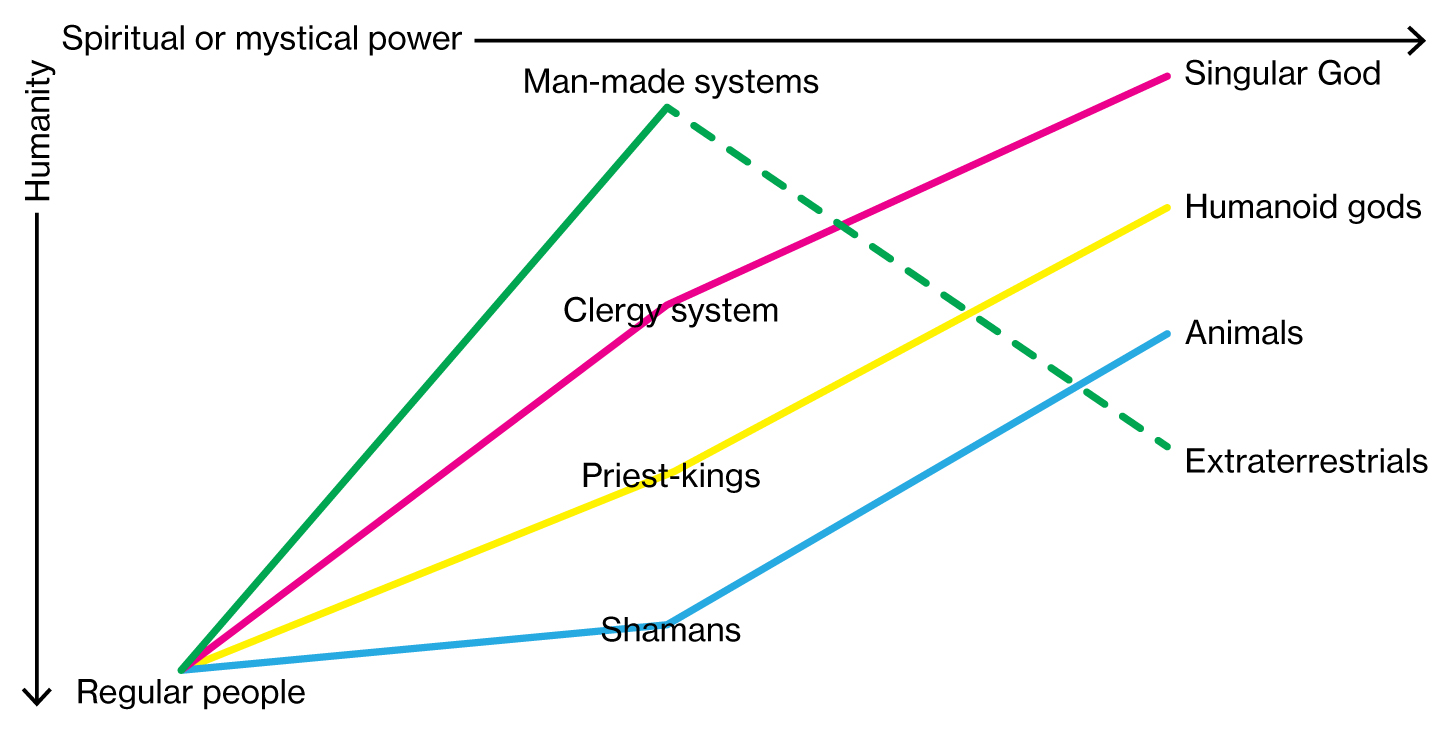
Diagram of the human accessibility of interpreters and of the power they represent across human eras.
As illustrated by the most insane graph I've ever made, the "humanity"—the ability of a normal person at the lowest level to approach and understand each party—has decreased at each of these steps, from "one of the guys in the cave" to a sort of career to a class of citizens protected by wealth and law. Today, we are ruled by computer networks and corporate enterprises and nation-states; systems of control that emerged at some point from human minds and yet lack any foothold a regular person might find to grasp their functions. At this inflection point, we find ourselves imagining an entity beyond these systems' reach which is at once terrifyingly powerful and paradoxically more human-like than our own arcane creations. If an alien being's motives are unknowable, at least they're widely reported to have faces and arms and legs.
UFOlogy is a substitute folklore, a last-ditch pass by the collective subconscious to kick the can of reckoning with our innate need to imagine a greater power a little further down the road. It's the manifestation of a need for connection and absolution we like to think we've engineered away. We think, or prefer to think, that Paved over and deferred, this primal drive isn't dead and probably can't be killed. It will resurface in new ways which satisfy—or at least trick—the newer, more logical centers of the brain. Are aliens real, in the empirical sense? Signs point to no. And yet they persist, their reality irrelevant, because in a world subsumed by reason and poisoned by clarity, we need them.
The languages of the dying suns
are themselves dying,
but even the word for this has been forgotten.
The mouth against skin, vivid and fading,
Can no longer speak both cherishing and farewell.
It is now only a mouth, only skin.
There is no more longing.
Translation was never possible.
instead there was always only
conquest, the influx
of the language of hard nouns,
the language of metal,
the language of either/or,
the one language that has eaten all others.
— Margaret Atwood, Marsh Languages
07.04.23
On Twitter
I'm sad that Twitter is going away, or at least becoming less usable at alarming speed. It's a blend of several types of sadness. There is a sense of nostalgia; the strange feeling of losing something that was never yours, the pang of watching a crane demolish your hometown mall.
There's the feeling of futility and powerlessness at watching something you value be killed by a stranger whom society has granted immense wealth and power despite being, by any account, a "showboat and a dunce." The capitalist-hellscape ennui associated with a stark reminder that everything you like or care about, regardless of utility, is merely a bad fiscal quarter away from nonexistence is part of it. And there's also a sweaty uncertainty for the future, as we scatter to the tides of online: many people I know from Twitter are moving to Bluesky or Cohost or something else, and I will still see them around and hear from them now and then. But the unity—in proximity, if not in culture—is dissipating forever.
I think it sucks that the ambient attitude toward Twitter's collapse is a cynical glee just because its owner is a piece of shit and the collapse stands to possibly cause him financial harm. It's pyhrrically funny to see this unfold how it has, but in no timeline would I choose to give up something like Twitter in order to harm the livelihood of a rich guy I personally loathe and a bunch of software engineers I don't know. I would prefer to never think about them! In a reality where the online platforms we use have to be owned by somebody, the ideal scenario is for that owner to be a sort of hands-off landlord who doesn't call very often or let his weird nephews stuff flyers for their AliExpress reselling business under the door. From the irony-hardened mind of a longtime poster, it makes reflexive sense to proclaim that this is what you always wanted. It saves face, when the walls are coming down, to cement "Aha, these walls sucked ass!" as your take. I don't even think it's a farce to call yourself smarter than Elon, who is demonstrably very stupid. But it blows to leave something behind, and it's okay to express remorse over it even if—especially if, maybe—you've been forced to give it up by circumstance. To overdramatize massively, I don't think the Russian villagers who left their cottages and crops ablaze ahead of the French army were yukking it up with the neighbors about how Napoleon deserved it for being "cringe."
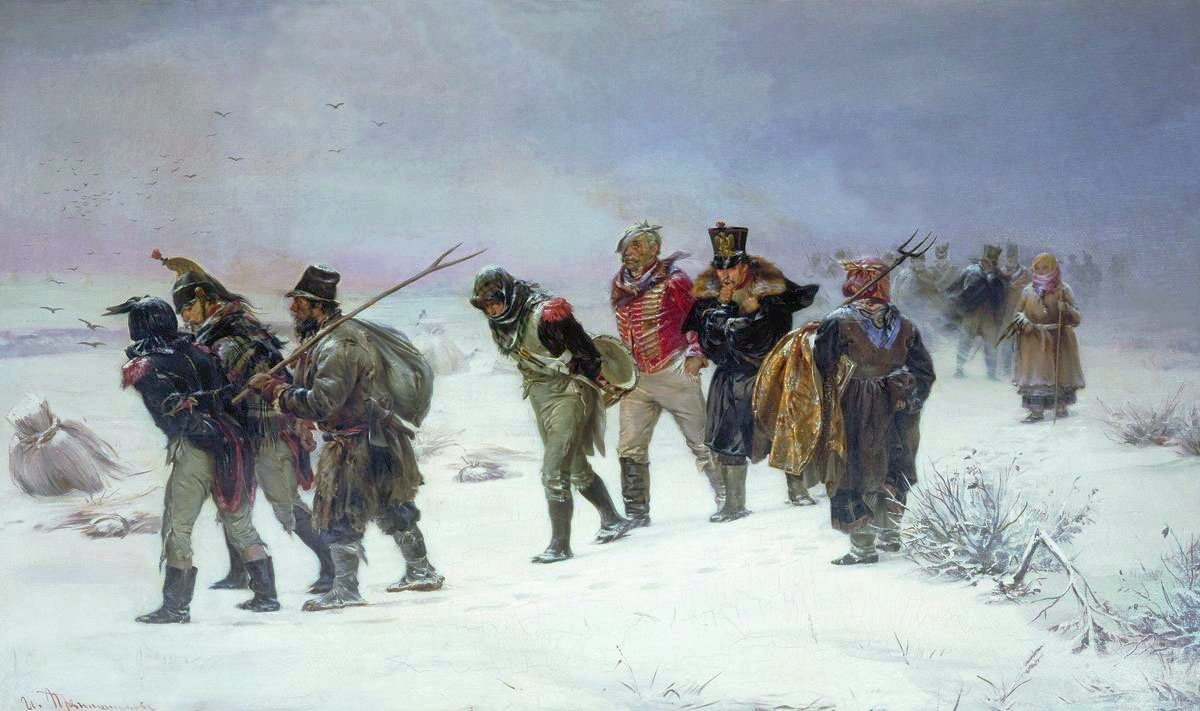
Episode of the war of 1812 by Illarion Mikhailovich Pryanishnikov, 1874. Wikimedia
We all know Twitter is-slash-was a net social ill; it was abused by bad actors and misunderstood by its owners for basically the entire lifespan of the service. As a straight white man I almost certainly missed the worst goings-on; the place was lousy with Nazis and scammers and sex creeps until the bitter end, which is when most of the scammers and creeps started paying monthly to make the place much lousier. I joined Twitter in September of 2012, when I was a tender thirteen years old (if you know a thirteen-year-old child, please stop them from doing this) and I think I recieved between five and twenty spam DMs a week for a straight decade. The Musk-administration reforms could be allegorized as the new owner of a factory that manufactures extremely annoying guys cutting costs by dumping toxic waste in the town reservoir.
And yet. And yet! There were also good people there, nice people I care about and respect, whom I couldn't have met any other way. I formed friendships and creative partnerships with so many talented, wonderful, kind individuals. Groups I'm proud to be part of—DESKPOP, CARI—would exist but I would never have learned about them and subsequently been able to join in. As a conductor for social interaction Twitter was lower-resistance, for better or worse, than anything else. Twitter was the sociological equivalent of the jelly they use in Petri dishes to grow bacteria: a medium so easy that every community imaginable took root with total ease and fermented over years into its logical extreme state. Sure, that includes communities like Taylor Swift extremists and flat-earth evangelizers. It also includes communities with good premises and nice members. No website is ever going to reach notable size without hosting both.
To talk business for a minute, one thing I am very sad and worried to see go away is the discoverability and exposure Twitter brought freelancers and creators. I depend on freelance income to pay my bills most of the time, and I consider myself pretty fortunate to get the amount of work I do. All of it comes from online connections and references, and the huge bulk of those originated on Twitter. As much as I grimace to self-advertise, it's necessary to keep living my life (in the real world—hey, remember in 2013 when people tried calling that "meatspace?" That was wack) the way I like. Twitter is very obviously sputtering out as I write this, and if it fully shuts down or if the emigration of users speeds up substantially I don't see a good alternative platform that serves artists like myself the same way. And speaking of grimacing to self-advertise, it also lets me do that in a way that was at least tolerable to me: sharing work, posting links, always keeping it earnest and real. When I think about grappling for "exposure" by mechanically separating my creative process, mashing it into performance-ized goop, and extruding it as emulsified pink slime in the form of a TikTok or an Instagram Reel I think about chucking my laptop in the river and getting a regular job. I know people who do pretty well at these things—but reader, if I am ever in such dire straits that I start uploading portrait-mode videos of myself designing scored with Fleetwood Mac nightcore or whatever, I am authorizing you to take me out.

The endless tube of hot-dog goo represents content. That's the metaphor I was building. ResearchGate
The root of this problem, and something I've talked about at length before, is that corporate assimilation has made the Internet too fragile and too small to survive. With everything compacted into a few sites upheld by a few investors, and those investors trained to yank the rug at the first sign of unprofitability, any of the remaining major platforms could basically wink out at any moment—and given how deep we've let capital stripmine online spaces, a fifth to a third of human knowledge hosted on one of these sites would just evaporate overnight. It's our fault, in some ways—convenience supplanted vigilance, art became "content," forums became subreddits—but there's no way back now. "We are living through the end of the useful internet."
My prescription for this problem has been to get small again, to spread out our personal online footprints beyond one critical dependency. But the fences and boundaries put in place by capital to divert and attract traffic make it impossible to regain the networked sense of discoverability within "the Internet" as a whole the way it existed on Twitter. Search engines are in their last useful days, as endless GPT-generated garbage chokes out real results. The "AT Protocol" dream of social media as a unified, distributed standard like email is years away from fruition and frankly seems doomed to fail the profitability requirement for existing very long in this world. This all stinks! It's fun to have a little website. It's probably healthy (both in a Marxist labor-reward sense and as a low-pass filter for toxicity) to return a little craftsmanship to the online experience. Building a whole page from scratch without the scaffolding of a post format is nice! The less you depend on a corporation to hand you in terms of tools, the more freedom you gain in your voice and style.

Compositors' Work And Stereotyping, Jan van der Straet, ca. 1580. Wellcome Collection
And yet. And yet! What the distributed, re-personalized Internet can't offer is the audience and conduit to that audience that made Twitter so powerful. You can share things in the same channels where people who like them will learn to look. The pyramid effect of your followers sharing your work to their followers meant you can have things unexpectedly blow up—and for all the weird haters who always show up, it's a nice windfall for people who depend on that organic, word-of-mouth (word-of-phone?) exposure for a career.
It's difficult to imagine a standalone webpage "doing numbers" the same way a Tweet randomly can. It's not 2002 anymore, and people have been trained to fear exploring away from the major sites. The environment of the modern Web is designed to keep you on marked paths in monetized spaces for as long as you're awake. The boomer cry of mass ADHD is halfway accurate, but the general reduction of attention spans isn't an emergent result of technology adoption—it's the intended outcome of years of social maneuvering by profit-driven entities with profits created by higher usage time and more ad space.
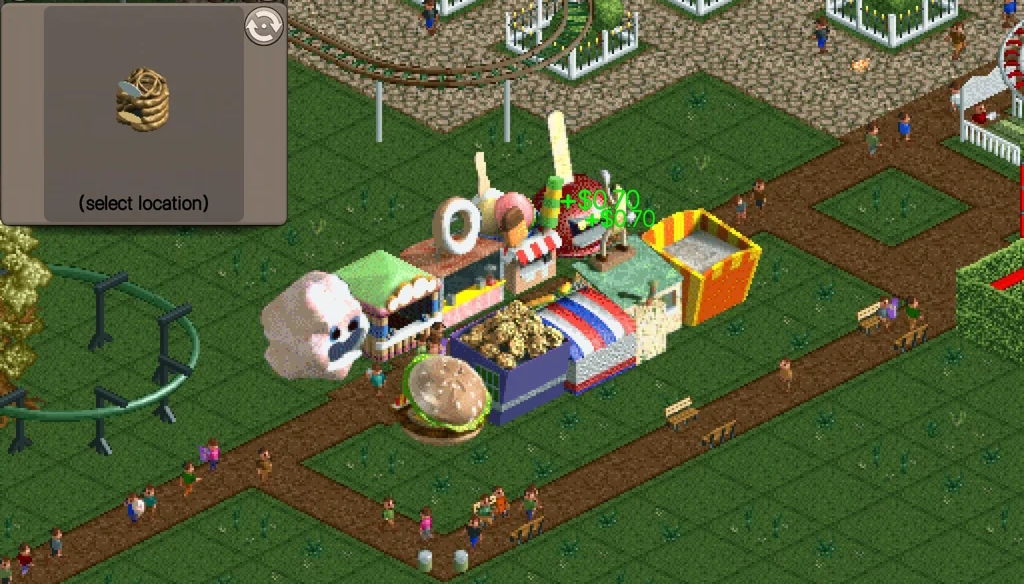
We're locked in, and they're gouging us on pretzels. Reddit user BJoshua34
All this is to say that I am really sad to see Twitter go, even for all its problems, and I am nervous that the future looks grim for artists who needed it. You can find me on Bluesky, but it's not the same.
© 2024 Jack Grimes. Made by human labor.
